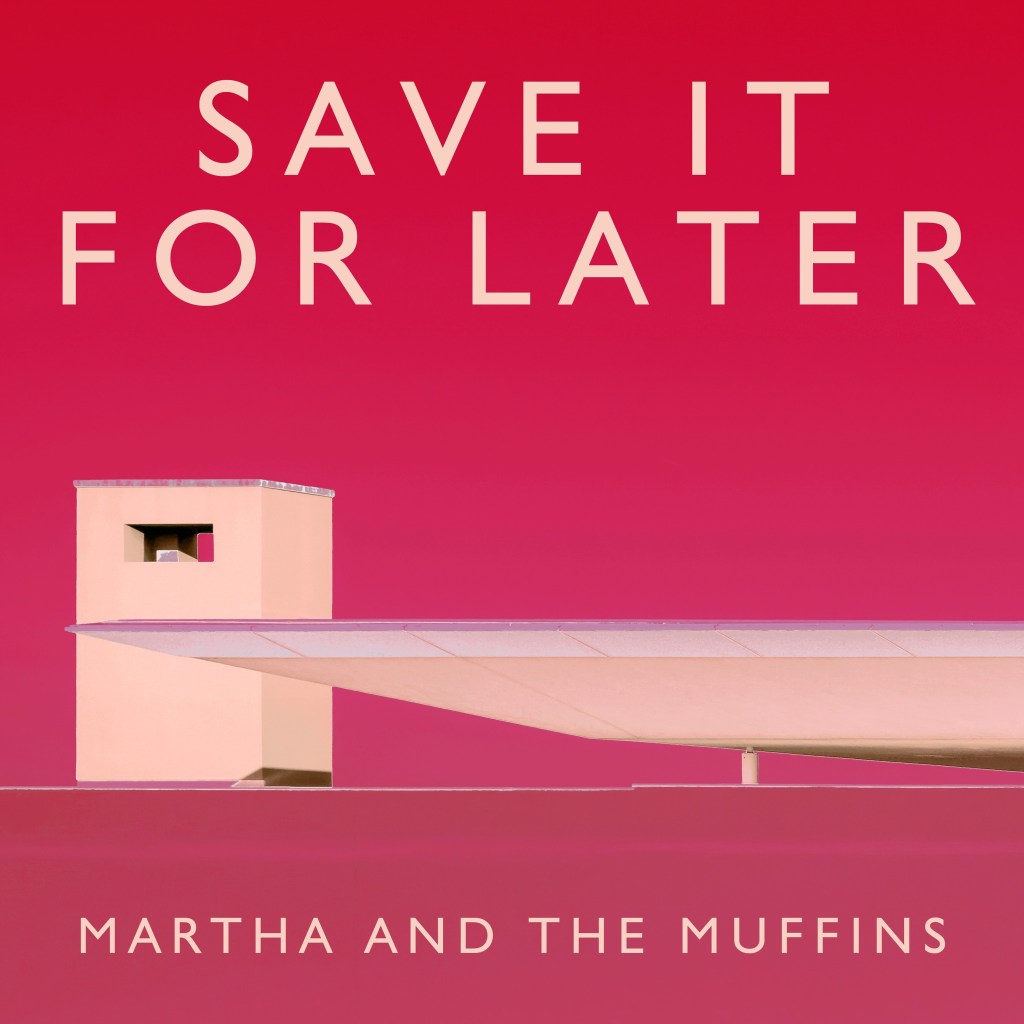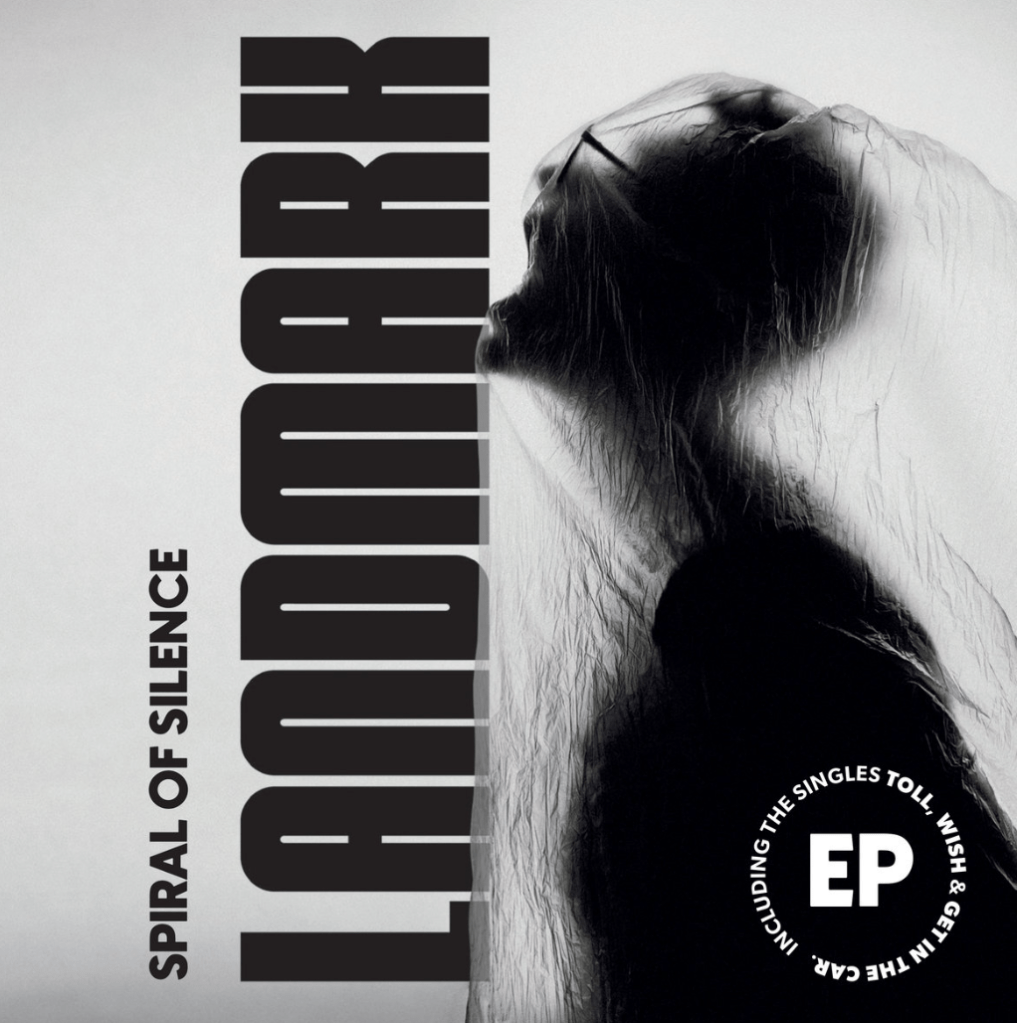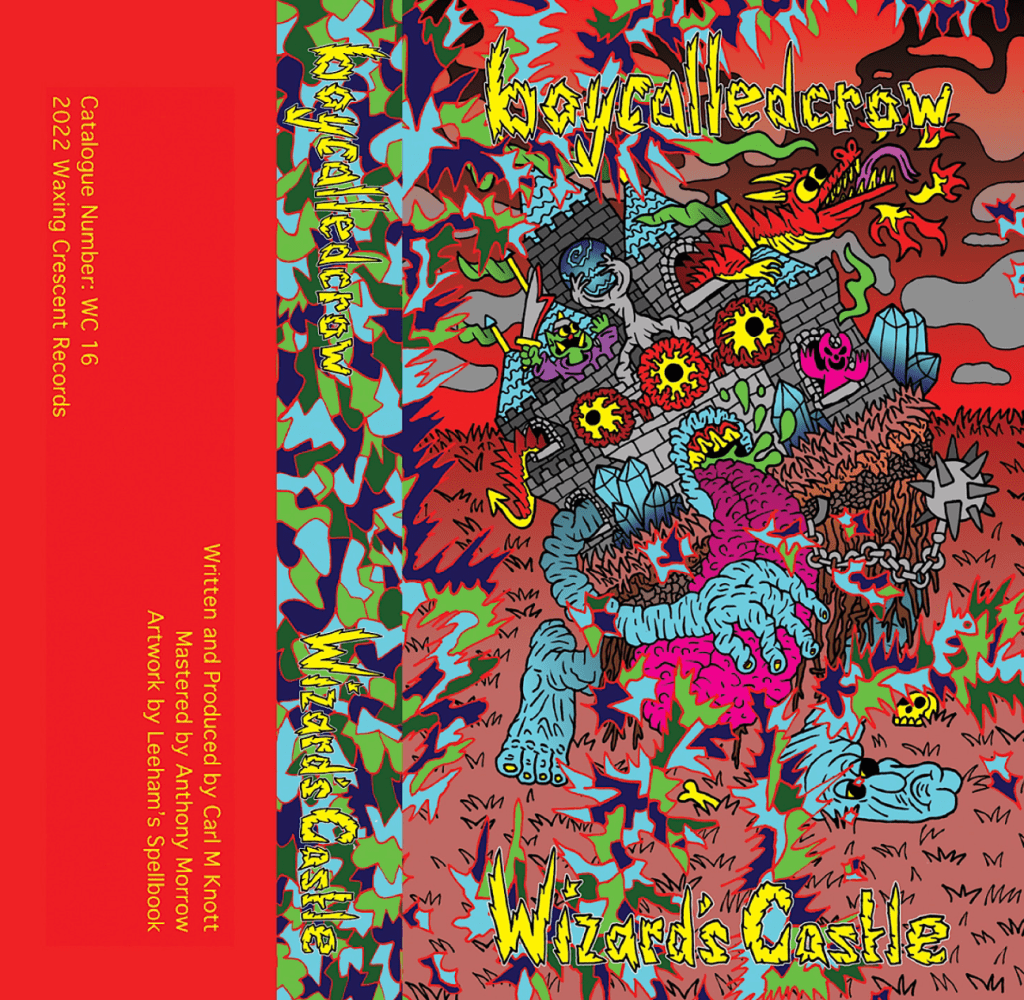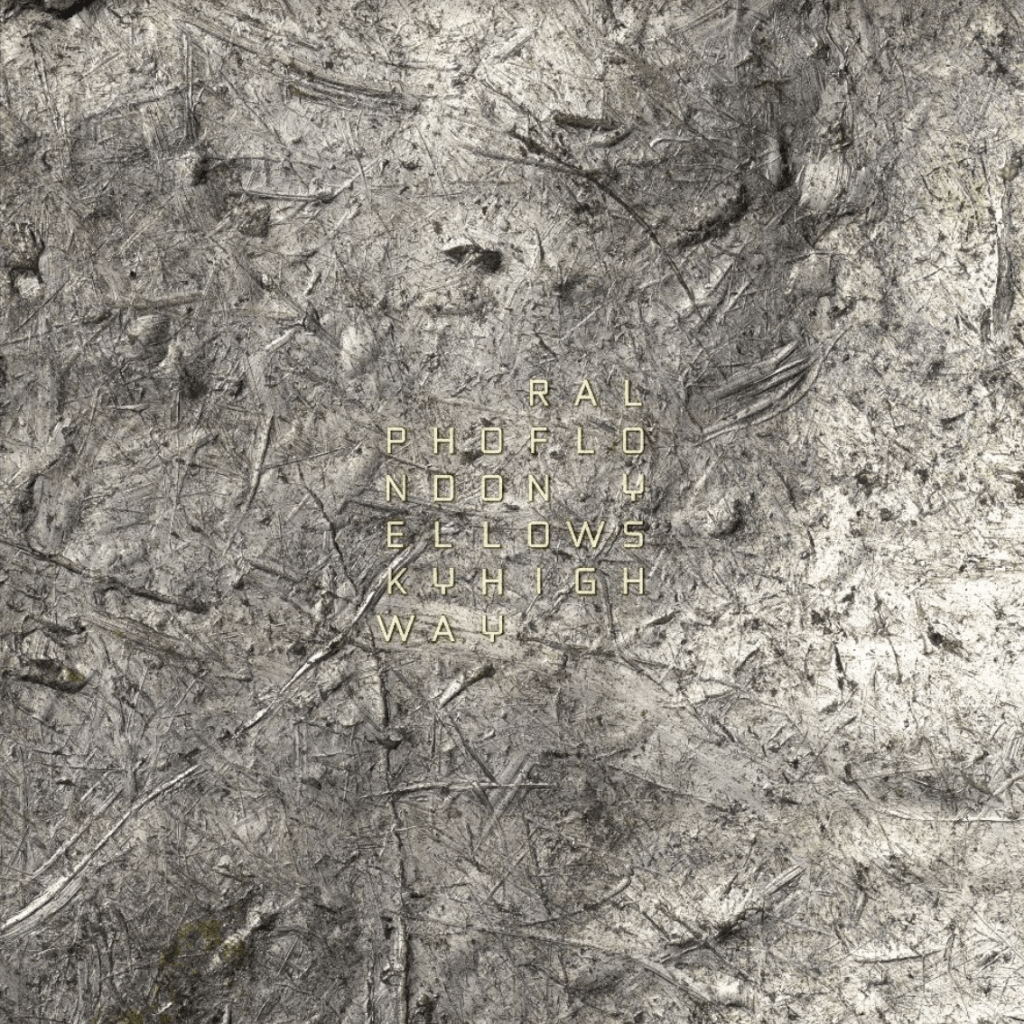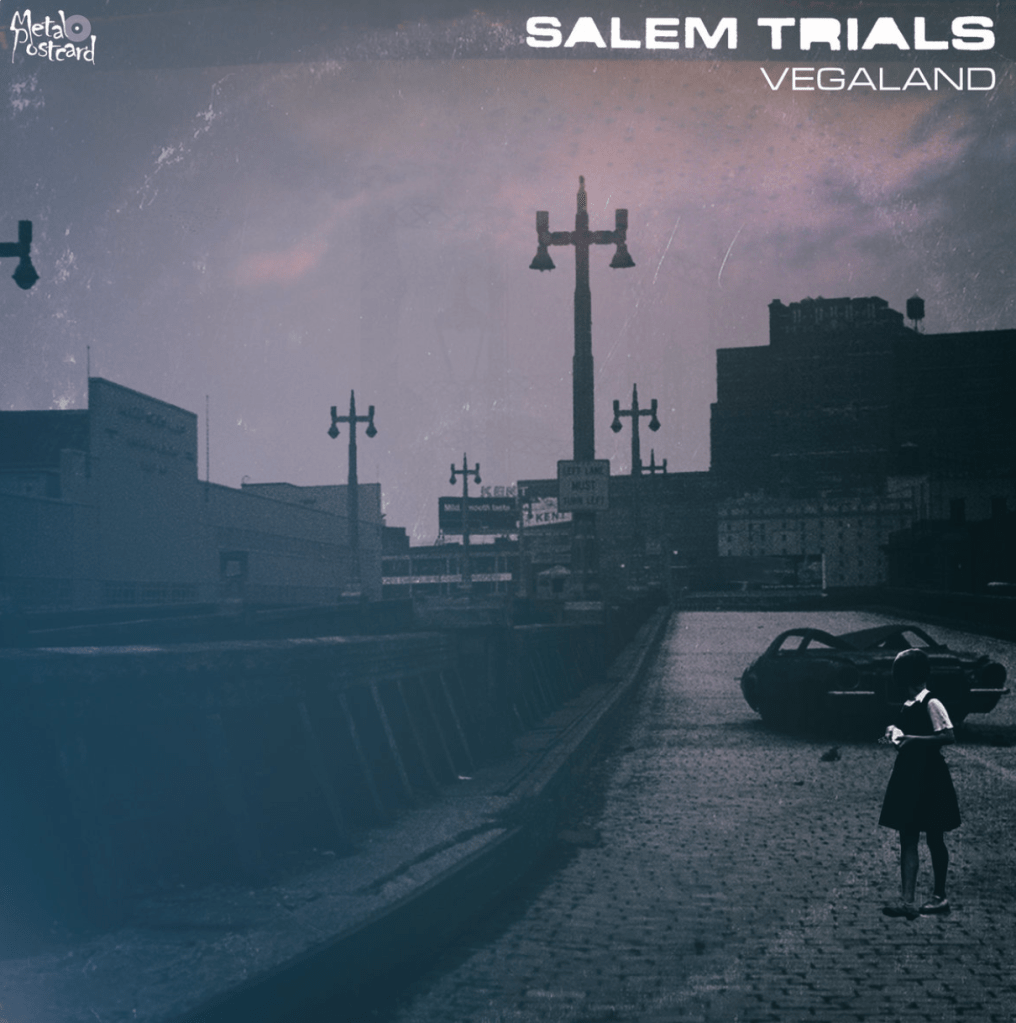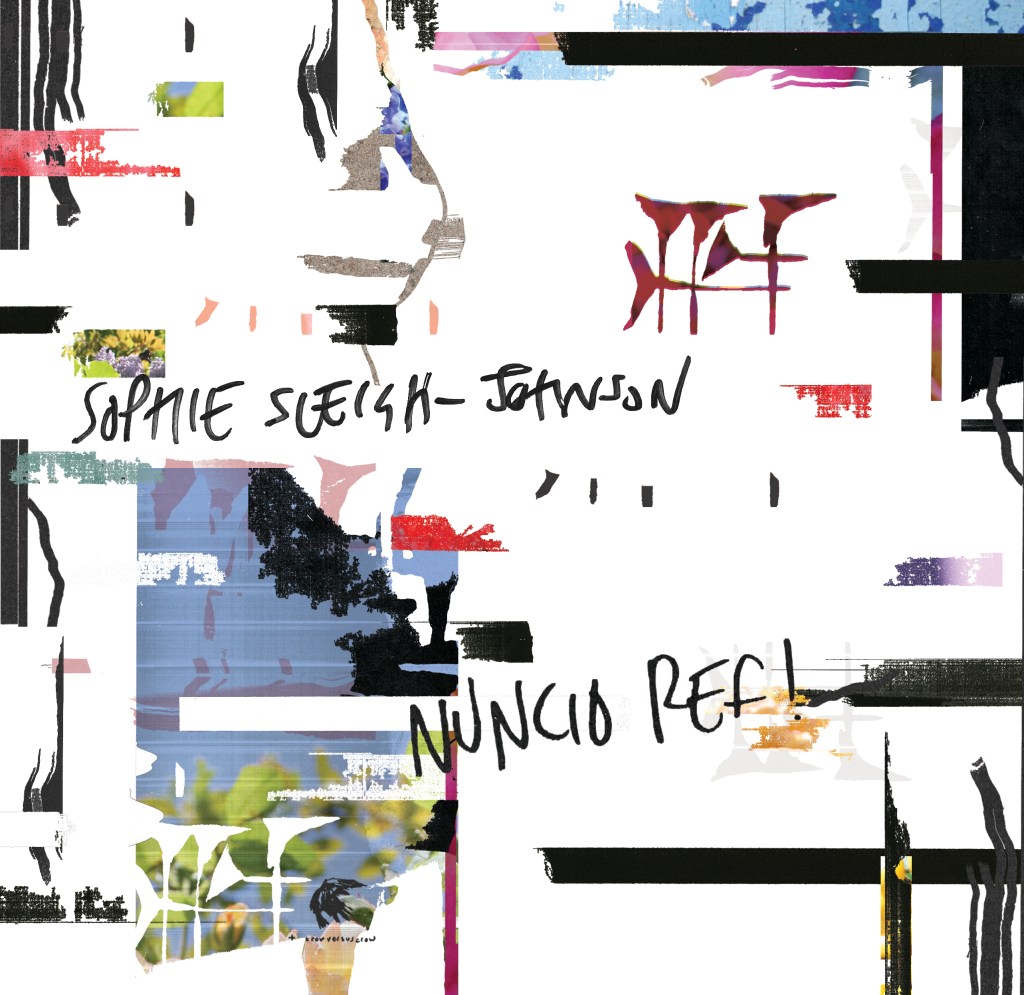The Monthly Playlist Revue: May ’22: Junior Disprol, Misha Sultan, Vera Di Lecce, Celestial North…
May 30, 2022
THE PLAYLIST
Dominic Valvona/Matt Oliver/Brian Bordello Shea
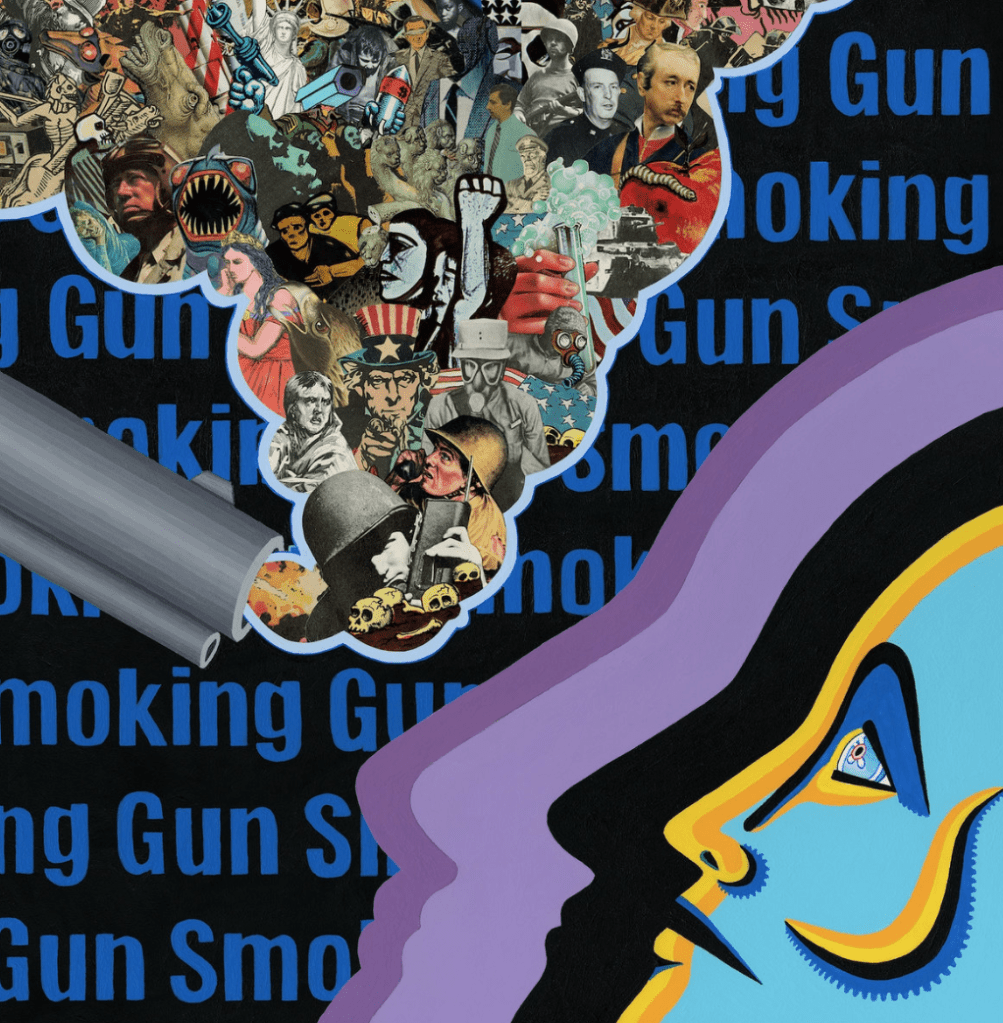
All the choice tracks from the last month, plus a few missed ones we’ve corralled from last month, the Monolith Cocktail team’s playlist revue is both a catch-up and showcase of the blog’s eclectic and mind bending tastes. Sitting in on this month’s selection panel is Dominic Valvona, Matt Oliver and Brian ‘Bordello’ Shea.
TRACK LIST IN FULL IS:
Junior Disprol Ft. Krash Slaughta ‘Rotund Shogun’
Deca ‘Tuning’
Exterior ‘Orthodox Dreams’
FAST DE ‘Miss Trutti Finally Found Her Gem’
Pussy Riot Ft. Slayyter ‘HATEFUCK’
Masai Bey ‘Stanza X’
BITHAMMER! ‘Make You Mine’
Flat Worms ‘Into The Iris (Live)’
Salem Trials ‘Vegaville’
Walker Brigade ‘Disease’
Team Play ‘Sunrise’
James Howard ‘Baloo’ Adam Walton ‘Mary Sees U.F.O.S.’
Joviale ‘UW4GM’
Shabaka ‘Black Meditation’
Kritters ‘New York’
Ralph Of London ‘Lys’
Ethan Woods ‘Utopia Limited (Cuddly Tie-In)’
Staples Jr. Singers ‘I’m looking For A Man’
Ramson Badbonez ‘Rap Bio’
Mr. SOS & Maxamill ‘War Criminal’
The Difference Machine ‘Old Men’
Omega Sapien ‘Jenny’
Mr. SOS ‘Peace & Prosperity’
Jermiside & The Expert Ft. Tanya Morgan ‘Crime Rule The City’
Quelle Chris ‘DEATHFAME’
Wish Master & Billy Whizz ‘THOUGHTS OF THOUGHTS’
Guillotine Crowns ‘Killer’ Orryx ‘Eldritch’
Celestial North ‘When The Gods Dance’
Henna Emilia Hietamäki ‘Protesti’
Lucrecia Dalt ‘No One Around’
STANLAEY ‘Fluorescent Fossils’
Your Old Droog ‘Go To Sleep’
Tommaso Moretti Ft. Ben LaMar Gay ‘A Call For Awareness’
Black Mango Ft. Samba Touré ‘Are U Satisfied’
Avalanche Kaito ‘Flany Konare’
Tomo-Nakaguchi ‘Halation’
Private Agenda ‘Splendour’
Sebastian Reynolds ‘Four-Minute Mile’
Chouk Bwa & The Ångströmers ‘Agwetaroyo’
Misha Sultan ‘Nyepi’
The Master Musicians Of Jajouka ‘Khamsa Khamsin’
Gustavo Yashimura ‘Las Prendas del Corazon’
Stephanie Santiago ‘Activa Tu Cuerpo’
Gabrielle Ornate ‘Free Falling’
Black Monitor ‘Xexagon77’
Borban Dallas & His Filipino Cupids ‘Too Convenient’
Martha And The Muffins ‘Save It For Later’
Super Hit ‘Blink 182’
Reverend Baron ‘Let The Radio Play’
Alas The Sun ‘Distant Drone’
Jelly Crystal ‘I Tryyy’
LINN ‘Happiness Is Real’
Lenka Lichtenberg ‘That Monster, Custom’
Brigitte Beraha ‘Blink’
Vera Di Lecce ‘Altar Of Love’
Francesco Lurgo ‘I Am Already Far Away’
Hi, my name is Dominic Valvona and I’m the Founder of the music/culture blog monolithcocktail.com For the last ten years I’ve featured and supported music, musicians and labels we love across genres from around the world that we think you’ll want to know about. No content on the site is paid for or sponsored and we only feature artists we have genuine respect for /love. If you enjoy our reviews (and we often write long, thoughtful ones), found a new artist you admire or if we have featured you or artists you represent and would like to buy us a coffee at https://ko-fi.com/monolithcocktail to say cheers for spreading the word, then that would be much appreciated.
Dominic Valvona’s Essential Roundup
Unless stated otherwise, all releases are available to buy now.

The Master Musicians Of Jajouka ‘Dancing Under The Moon’
(Glitterbeat Records) 13th May 2022

Truly atavistic, the Rif Mountain ensemble known as The Master Musicians Of Jajouka were once heralded by William Burroughs (no less) as, “the four thousand year old rock and roll band”. Carrying a real mystique until more recent times this Moroccan outpost, holy mountain shrine located group claim descent from the venerable Ahl Serif tribe (which roughly translates as “the saintly”) and their sacred idol, the legendary Arab healer Sidi Hamid Sheich. And in an act of preservation they continue to keep the signature double reed Ghaita flute (an instrument almost identical to the Arabian Mizmar) and Lira (a fiddle-like instrument) led mesmerising, entrancing and leaping performative music that goes hand-in-hand with their devotion alive.
Until the last century Jajouka and music created there were virtually unknown. That was until the well-travelled artist and Burroughs foil Brion Gysin made the wild trip across an antiquity-rich African landscape to that remote village hideaway in the Jebala foothills. Passing such incredible ancient relics as The Pillars Of Hercules, and the final resting place of Jean Genet at Larache, Gysin found real nourishment and something inspiring when introduced to a previous incarnation of the troupe. Making various connections after witnessing shaggy sheepskin adorned dancers bounding over a bonfire to ‘wooden trumpeted fanfares’, Gysin saw something far older, a cultural lineage that predated Sufi mysticism, going back further towards Pan-like Greek and Roman ritual and Persia.
Bringing back his own recordings to London at a later date in 1968, he’d turn on his old mucker and Rolling Stone Brian Jones to this ancient, but very much alive, trance. No stranger to picking up on and embracing world sounds and instruments, Jones would be inspired to make his own trip to Jajouka, taking the sound engineer George Ckiantz with him. God only knows what the locals must have thought of the pretty much strung out by now, hippie Jones, but they welcomed him into the fold nonetheless, introduced to the chief in that period and defacto band leader Abdeslam Attar. As was the custom, Jones and Ckiantz made a number of recordings during their stay. Released at a later date (posthumously for Jones) with added electronic phasing and cutting methods to encourage a more psychedelic montage effect, these tapes made up the first release on the Stones own label imprint in the 70s.
Pretty much blowing the lid of this isolated group, a succession of visitors made the journey pilgrimage; from jazz deity Ornette Coleman, who jammed with the ensemble for his 1975 album Dancing In Your Head, to Rolling Stone writer Robert Palmer and the American photographer Joel Rubines. The latter, who as it happened was fluent in the Darija Arabic dialect, made the now famous, and purist at that point, The Master Musicians Of Jajouka recordings. A decade on and the Stones came knocking for real this time with an offer of collaboration, followed not too soon by the explorative Bill Laswell.
Fast forward another couple of decades and the now Bachir Attar led group invited the Italian musician and engineer Jacupo Andreini to record the most comprehensive testament yet. What he captured is now in the hands of Glitterbeat Records, a double-CD spread of ten-minute plus adorations, romances, courtly music and processions.
A septet of heralding circular-breathing fluted horns, the quivering frayed twang and pluck of Liras, galloping drums and a unison of voices conjure up visions of mystery, rituals and moonbeam bathed dances. We could be atop of the holy mountains, but also anywhere along the antiquated Mediterranean coastline, to Moorish Spain.
Venerations to the master but also Islamic faith, including a flighty, swallow-winged wispy and willowy avian prayer to Allah, appear alongside the regal and lively. ‘Hlilya’ is something altogether different; a sort of ancient bounced progenitor of Breakbeat and 2-Step.’Khamsa Khamsin’ with its triple reedy drones and fanfare parade could even be said to have a hint of swing, even jazz about it. This processional, as well as the dancing ‘Opening The Gate’, would have, at one time, been the accompanying tunes for the Sultan’s walk to and back from the mosque.
Like a chorus of busy buzzes or a sustained mizzle, the sound of a trio of Ghaitas is a thing to behold. And when the frame-like drums appear it’s a both beautified and racing entrancing experience like no other. That weaved and bowed Lira has a great sound too; a twine and bandy tone that reminded me of the Appalachians.
Atonal, mesmerising and yet melodic the atavistic music of this holy anointed sanctuary has never sounded so intriguing. No wonder Ornette was so eager – they were even flown over to play at the science-fiction jazz innovator’s funeral. He heard, saw what you yourself can now enjoy, bathe in; music that doesn’t just travel back decades but a millennia, all the way back to the once great Persian empire and beyond. But this isn’t just artifact, an exercise in ethnography, but a living, breathing form very much alive and stirring.
Avalanche Kaito ‘ST’
(Glitterbeat Records)

Full disclosure time. Many of you maybe be aware that on occasion I’ve moonlighted to pay the rent as it were, working with various labels (Analog Africa, Spiritmuse, Pindrop) and artists (Kahil El’Zabar, Lost Colours, Hello Cosmos, Matt Donovan) over the last five or more years. In the last year I’ve been commissioned to write the inviting words for a couple of Glitterbeat Records projects, most recently Širom’s The Liquefied Throne Of Simplicity album. But I’ve also provided the words for the label’s Griot post-punk phenomenon Avalanche Kaito and their debut titular album. I’ve included it not so much as a promotion, but just because it’s a truly incredible record. Anyway, find my original draft-like review showcase below:
Emerging from an entirely original dimension in sound, the polygenesis Avalanche Kaito redefine what it is to talk with the ancients whilst leaping forth into a futuristic chaos of noise on their debut album journey. A palpable experience with each sonic blast, each layer a revelation, this simultaneously taut but expansive universe in which the oral traditions of the West African griot converge with Belgium post-punk, krautrock, math rock and the industrial exists in its own space.
Initialing colliding together as a duo, the Burkina Faso urban griot and multi-instrumentalist Kaito Winse and Brussels noise punk drummer Benjamin Chaval were joined by Chaval’s growling, grinded bassist sparring partner from a previous incarnation, Le Jour du Seigneur, Arnuad Paquotte on this specific line-up’s vision of ancestral proverb metaphors and dataist inspired technology. Although released this summer, eight months after the debut showcase EP, Dabalomuni, the guitarist from that extraordinary otherworldly session, Nico Gitto is now, going forward, part of the transformed setup; not so much replacing Paquotte as expanding the sound into another direction.
Aided by another influential cog in this wheel, Chaval’s previous band manager Michael Wolteche helped to shape this myriad of elements and strands, which coalesce into a dynamic, often intense yet unruly cosmic ritual and unlimited expression of change.
That previous EP was just a small window into a greater universe of animalistic symbolism poetics and allegorical stories wildly vociferated and loquaciously delivered under a rich exotic canopy or, echoed out into space, the ether. With the help of the visual language programme PureData (an open source apparatus for creating interactive computer music and multimedia works) and his pummeling, rattled drumming, Benjamin and his deeply trebly prowling, sinewy bassist foil Arnuad create an effective torque of post-punk-prog-tribal-free-jazz-industrial-electronic tumult for Kaito’s fluty rasped, bow quivered, messenger drums beating commune with his roots and life in a very different bush of ghosts.
The message that underlines Kaito’s griot ancestry and the band’s motivation, spontaneity, was explained in a recent interview they did with Parisa Eshrati for the Trial & Error Collective site, with Michael’s onus on the ‘live’, opining that: ‘Today we see that everything is dematerialized, everyone is addicted to playlists and clicks on the Internet. When the moment of the concert comes, we forget all that, and we get back to the spirit of the ritual, of the interaction between flesh and blood people.’
Although created in a studio setting that live in the moment feeling and dynamism is authentically recreated on this album. In that same interview Ben outlines the process: ‘There was an improvised stage in the studio with Kaito and me, and then this material was worked on, it went into the digital mixer, to be enriched with computational sourdough.’
In practice that blows up and out into the interdimensional slackened bass stalk of ‘Sunguru’, the wilder, quickened hysterics and danger of the progressive deconstruction ‘Douaga’, the Jah Wobble throbbed esoteric and celestial manifestation ‘Goomde’, and the Scott Walker atmospheric gloom and earthy soul tumbling ‘Eya’. At any one-time snarling yet hypnotic, willowy but thickened with brooding menace, animal spirits from an African exotica come alive to a mysterious matrix that evokes but never settles on warped sparks of 70s era Zappa, Yontan Gat, Fugazi, Black Midi, A Clean Kitchen Is A Happy Kitchen.
Magnetic, straddling multiple worlds, universes Avlanche Kaito are metal and flesh, blood and biometrics, tradition and transition, all wrapped up on a chaotic road trip. The open road, pathway from Kaito’s village home of Lankoé in landlocked Burkina Faso to Brussels via a digital mill in Montpellier and Mount Analouge proves infinitely more important, radical and creative than the destination.
Jimi Tenor ‘Multiversum’
(Bureau B) 20th May 2022
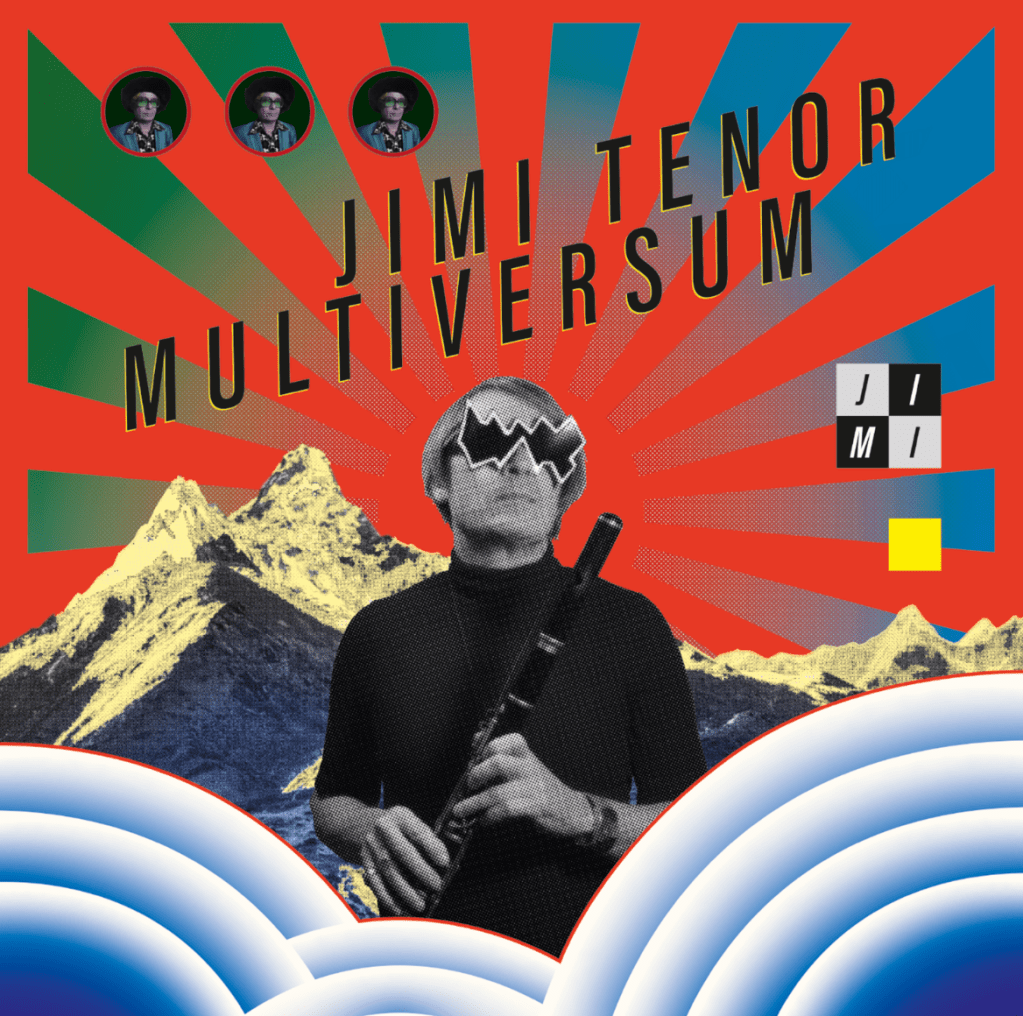
Continuing his “ikigai” (as it’s called in the press blurb) passion for diy home recording, the polymath Finn Jimi Tenor releases his third album for the Bureau B label this month. Following on from the catch-up retrospective NY, Hel, Barca and a collection of rarities, Deep Sound Learning, the multi-instrumentalist, nee “renaissance man”, now knocks out an album of originals that work around and off of drum machine beats and synth loops.
Multiversum channels the well-travelled and three-decade plus recording maverick’s eclectic tastes, but is also prompted by the label’s invitation to record an album based on Tenor’s basic live set-up of reeds and synth; a minimalist approach that he’s been using successfully for the past two decades. Proving no less effective, the scale of this enterprise is wide and deep; a brilliant run through a smorgasbord of musical styles and rhythms.
For an artist already renowned for his use of Afro-beat and jazz, and for his collaborations with the former’s beat provider doyen Tony Allen and other such luminaries as Kabu Kabu and Abdissa Assefa, Tenor once more draws on those founding genres to build up a mixed bag of dance and pop tracks, jazz-fusion peregrinations and nostalgic filmic and TV series theme tunes. Talking of which, Tenor’s ‘Slow Intro’ lead-in of cosmic flute, apparitional choral voices and passing satellites is part Les Baxter, part 70s soundtrack score.
A minute later (quite literally) and we’re properly transported to the multiverse with a touch of Greg Foat library music and shooting beam electro pop spiritual guided ‘Life Hugger’. Spells of floated, rasped sax and flute with beams of organ follow, on the acid-jazz bent ‘Jazznouveau’, and a trip-hop flighty fluted and whistled Cousteau dives languidly into ‘Uncharted Waters’ on the next fusion of sounds.
By the time we reach ‘Baby Free Spirit’ Tenor’s bobbing and bouncing down to a dance track of late 80s Chicago House and electronic body music: although the bass is extremely deep and menacing.
Showcasing more of his soulful, funky side, ‘Birthday Magic’ sends Marvin Gaye “skinny-dipping” down in West Africa. The Finale, ‘Bad Trip Good’, however, voyages seamlessly into both Jon Hassell and Desert Players era Ornette Coleman territories, to finish on a polygenesis sonic score, which also features an undulated low-level techno beat, sax lulls and coos and a soaring build-up of strings.
Kutiman, Alex Puddu, Eden Ahbez, Jeremy Steig, Weldon Irvine can all be detected, though Tenor’s cosmology hardly waits around to land on any of them for long. Jimi Tenor, like his name (a convergence of teen idol Jimmy Osmond and the Finn’s favourite instrument, the tenor sax), could rattle off these kinds of hybrid fusions all day long. His sensibility errs towards electronic pop but also a knowing, sometimes tongue-in-cheek take on cult, kitsch composers too.
Fundamentally its all dance music of a kind with an injection of global tourism; a universal canvas for omnivorous playtimes.
And if you can’t get enough of Tenor this month, a new Omniverse survey, almanac of his second great passion, photography, is dues out in tandem with this album.
During a break in his musical exploits – well, more like hitting a brick wall of a kind, believing it to be over before it had even started -, in 1992 Tenor found himself upping sticks to live in New York, where he took a job photographing tourists at the Empire State Building.
Images taken during that heady frantic time, when Tenor was juggling work with late night drinking bouts at the local Dominican restaurants and cramming in a seven hour shift at (once more) making music, sit alongside his promo shots and album covers. Fellow tourist booth pal and Tenor archivist of a sort, Hitoshi Toyoda lends a helping hand, having squirrelled away some of those New York shots. For fans and completists alike, it will prove an essential addition; sound-tracked by that latest album.
Lucrecia Dalt ‘The Seed’
(Invada Records) 20th May 2022
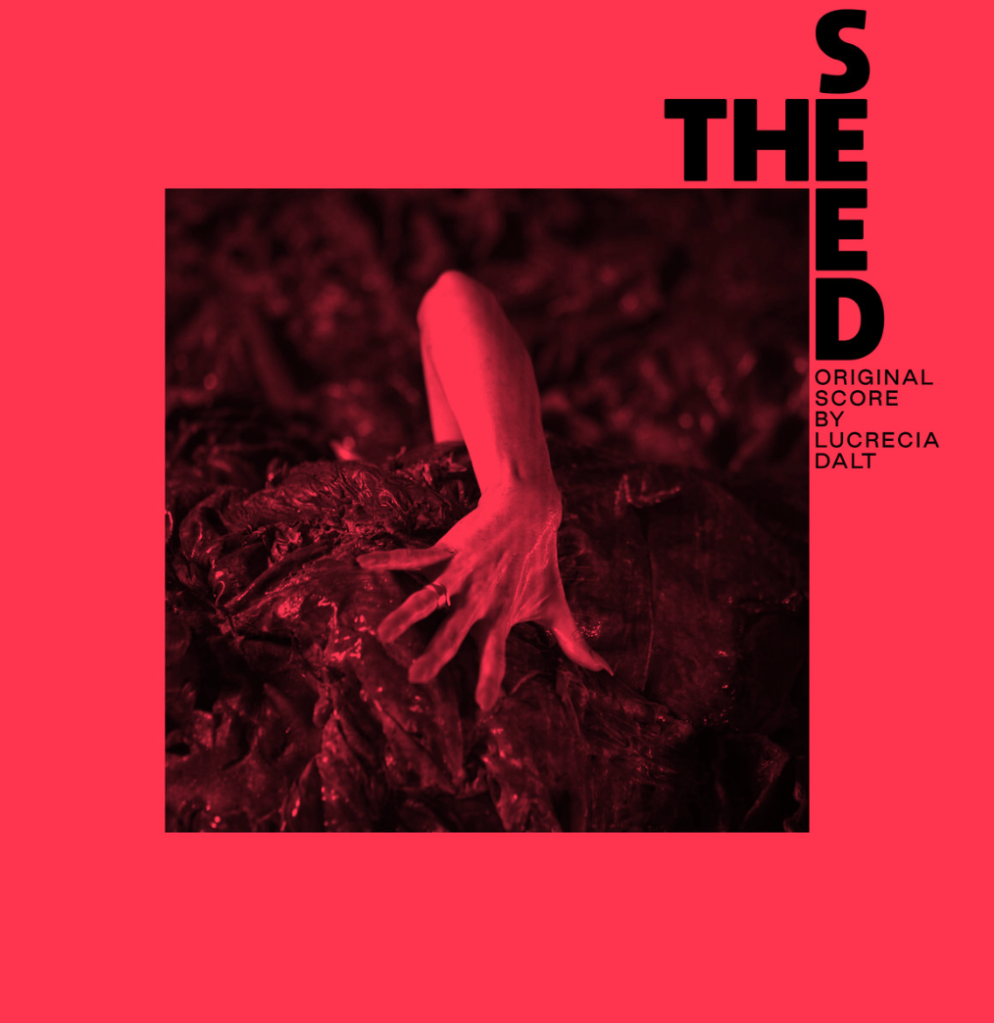
Lucrecia Dalt’s debut score deserves a better movie. Separated from the exclusive Shudder streaming service’s Sam Walker directed alien-horror trip The Seed, Dalt’s soundtrack proves a far more interesting, mysterious proposition of the otherworldly, esoteric and sci-fi.
The sound artist, musician and composer conjures up a pulsation of short evocations, stirrings and sinister presences fit for a Gallio horror, yet has to provide the atmospheric shocks and creeping menace for a millennial staycation under the stars: a narcissistic poolside monotony destroyed by an alien meteor shower. An E.T. body shocker, the visitor from another constellation proves both a helpless baby and yet alluring threat to the protagonists of this movie. All kinds of ugly, distressing impregnations follow as a seed is indeed planted: though it all could just be down to a particular grotesque trip.
Emanating from tape loops made through a Copicat tape delay, various digital synths and a Korg Monologue, the Biblical, mythological and cosmic all cross paths with sinister metallic forces. Rippled, purred tones, tubular mothership pipework, a frayed bow or two, drones and throbbing pulses are all that’s needed to convey the unsettling and alien. But there’s also plenty of bestial movements and some electronic beats to set the heart racing: the eyes flitting intently towards the dark corners of the room.
Set in a peculiar, bad mezcal tripping Mojave Desert, yet sonically without much in the way of a locational prompt, we could be in a macabre underground vault, bounding across lunar landscapes or aboard some Venutian spaceship. Diaphanous gravitas at the sight of astral phenomenon, concepts of E.T. contamination brought to Earth via meteors, ancient exorcism miracles and the fate of a penance-cursed Greek boulder pusher reference titles point to the action, drama unfolding on screen. The soundtrack growing gradually more warped as the characters lose their bodies, soul and minds.
Shades of Laurie Spiegel, Cliff Martinez, Bernard Szajner, Jóhann Jóhannsson, Pauline Oliverous and early Aphex Twin lurk amongst the considered, skilfully built soundscapes, zones, fears and wraith like stalking terrors. Saying that, there’s the odd ethereal voiced spirit, plus a springy catgut thumbed rhythm to be found on the mosey-down canter ‘Blob On The Lawn’.
Removed from the movie itself, the 26-track (all of which are mostly under the three-minute mark) soundtrack for The Seed signals a promising start to Dalt’s filmic aspirations. Though saying that, we shouldn’t be surprised that the incredibly experienced, multimedia composer has taken to this quite comfortably. With great care and a handle on leitmotifs, sounds the polymath artist convincingly scores horror and sci-fi with a certain atmospheric élan, a depth and real sense of the ‘other’.
It seems we won’t have to wait long for the next score either. Just as this review goes out, word reaches us that Dalt’s soundtrack for the recent SKY/HBO comic-horror The Baby is due to be released next week (May 27th), by the same label. ‘A journey into motherhood through a new – quite unexpected – lens’, we’re told, ‘the central character Natasha (played by Michelle De Swarte of The Duchess fame) is landed with a baby after a life of doing exactly what she wants, when she wants. Controlling, manipulative and with violent powers, the baby twists Natasha’s life into a horror show.’ The series was created by Siân Robins-Grace (Kaos, Sex Education) and Lucy Gaymer, and directed by Nicole Kassell and is produced by SISTER (Chernobyl, Landscapers) and Proverbial Pictures. Here’s a sneak peek:
Brigitte Beraha ‘Blink’
20th May 2022
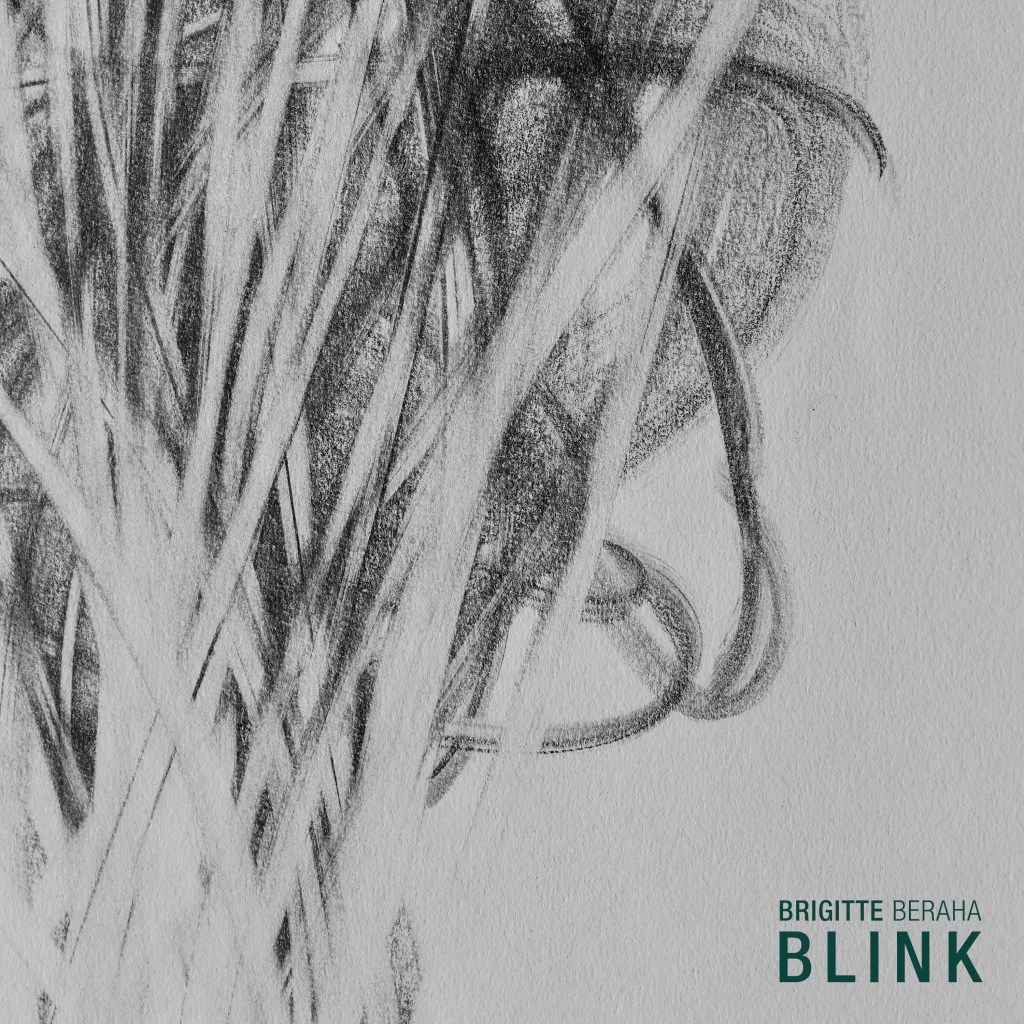
Barely tethered the second album from the incredibly voiced composer Brigitte Beraha and the Lucid Dreamers quartet captures the fleeting, the blink-and-you-miss-it moments, the intangible and abstract.
As the ensemble’s name implies, this is a must lucid and dreamy affair; an explorative jazzy spell that wonders into the avant-garde, minimal and classical, and evokes the free-flowing inspirations of a post Soft Machines Robert Wyatt, Talk Talk, Basil Kirchen and Steve Lacy.
Flanked and enveloped by George Crowley (on reeds and electronics), Aleyona Mick (piano and synth) and Tim Giles (drums, percussion and also electronics) Beraha’s ambled, cooed, fluid vocals are repeatedly morphed and transformed to sound like wisped siren calls and instruments; anything to give it all a congruous but experimental expression.
The improvised exploration tiptoe of post-punk-jazz meandering, ‘Doors’, features a spoken word journey that’s part Raincoats, part inanimate object fetish. A symbolic, conscious freedom that opens, sizes up and dances around the concept of doors and their wooden origins, suddenly takes in a philosophical sadness with spontaneous creaks and yucky yelps.
On the third improvised track, ‘Remembering’, Beraha’s voice takes on a phonetic transformation over a sparse, piano-plonky semi-classical accompaniment. The album’s most electronically charged of electronic compositions ‘Wait For Me’ almost merges that voice with the galvanized steel and zinc of Basic Channel techno sonics, squelches and tubular kinetics. Moans and coos blend with the emotional machine stimulator.
If we’re talking emotions then ‘Lullaby’ proves an evocative beauty of sadness and loss. Lyrically touching base with a father and daughter relationship, hints are conveyed of an eternal sleep, a resting place and conversations left unsaid. It has that Wyatt-like brilliance of lucid vulnerability. Swaned soothed saxophone, softened cymbal taps and plaintive piano offer the accompaniment. On another Wyatt enchantment, the title-track poetically articulates a yearn for the evanescent as trickles, washes and serenades flow into the cosmic-light territory of Donny McCaslin and Matthew Dunn.
Beautifully liquid, magical and unburdened Blink is a hazy brill and airy exhale of explorative jazz that will further cement the reputation of everyone involved: A most fantastic spell indeed.
Various ‘Sharayet El Disco: Egyptian Disco & Boogie Cassettes 1982-1992’
(Wewantsounds) 3rd June 2022
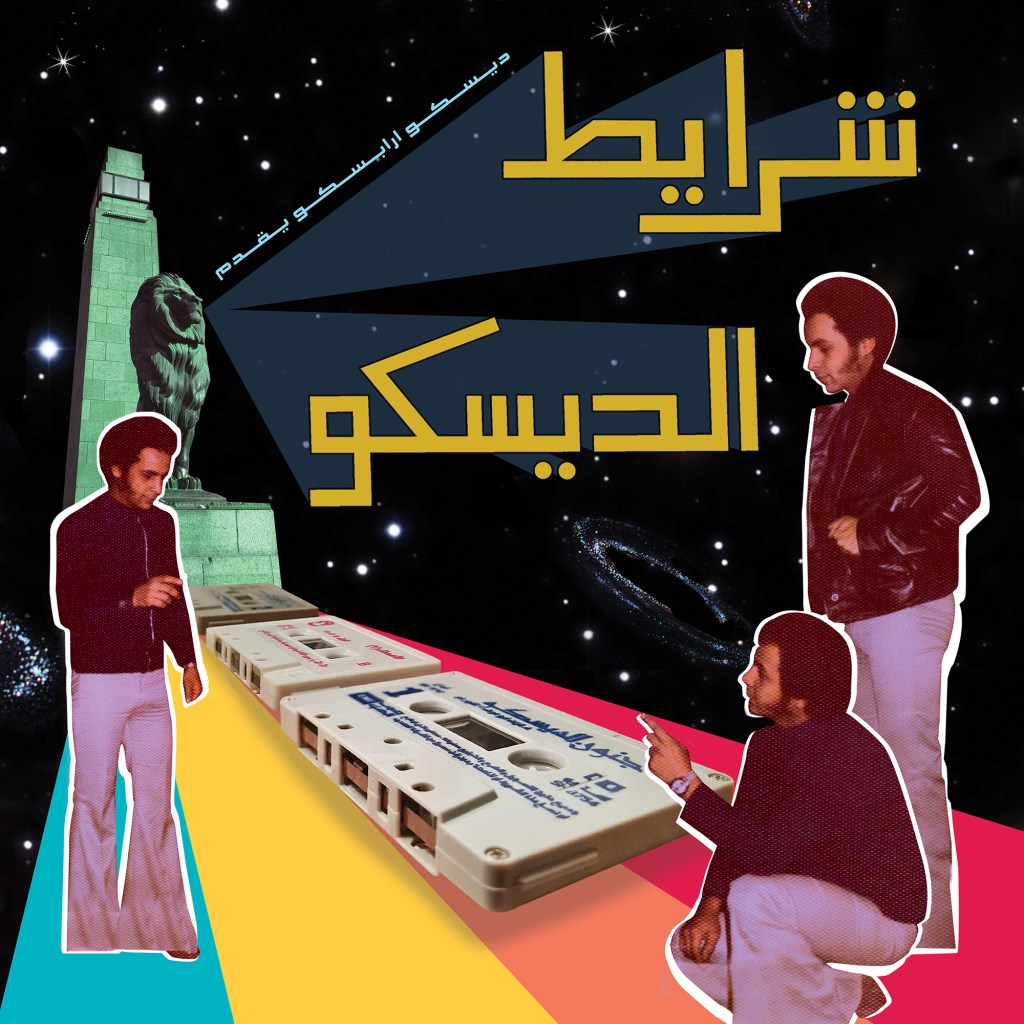
Pulled from the tape cassette culture of 80s and very early 90s Egypt by the Amsterdam-resided Egyptian deejay, Disco Arabesquo (otherwise known as Moataz Rageb), the latest release from the Wewantsounds label showcases a city, country that embraced the disco trend but made it their own.
Previously confined to what was a full-on endorsement of technology at the time, the majority of tracks on this compilation were only available on the cassette format. And so for the very first time those obscure and hard to track down Cairo tunes have now been made available on vinyl.
As one exotic, faraway oasis, North Africa (see Casablanca Records as only one of the most glaringly obvious examples) and especially a palm shaded Egypt has inspired and had the alluring effect on the original home of disco in the States. With its own special desert and Nile romanticisms and fantasies the Cairo scene was graced by a litany of stars from the not only the Arabian music world but stage and screen. Two such stars, actresses, Simone Philip Kamel (known simply as Simone on record) and Ninochka Manoug Kupelion (known professionally to adoring fans as Lebleba) make appearances on this boogie survey. The former, Simone, rests her signature soprano voice for Cairo Francophone chic and coquettish fun. ‘Merci’ could be a relative of the French female disco troupe New Paradise, only with a distinct Arabian dreaminess and matinee strings. Lebleba, who cuts a fun Egyptian version of a overflowing fruit hatted Carmen Miranda on the original cassette artwork, goes for a laser shooting disco heart-to-heart on the pop ‘Ana Alby Har Nar’.
Removed to the land of the pyramids, hints of Boney M can be detected wrapped up in the matinee stringed female/male shared pop-funk ‘Hezeny’ by the popular Al Massrieen (who Habbi Funk dedicated a compilation to a number of years back), whilst Odyssey dances hand-in-hand with Hot Chocolate and the Hues Corporation on Dr. Ezat Abou Ouf And El Four M’s enervated laser sweeping glitterball pastiche ‘Genoun el Disco’ – the four M’s by the way is a reference to the family group’s fourtet of diaphanous voiced sisters, Maha, Mona, Mervat and Manal.
Barely adopting the disco trend from across the ocean, no one could sound more Egyptian and less American than the famous singer/actor Eman el Bahr Darwish, grandson of the even more legendary ‘peoples’ artist Sayed Darwish. Eman shimmies across the bazaars to a souk funk of bellydancing percussion, rattling hand drums, willowed flute and a swirl of strings. It’s almost as if he’s stepping straight off a film set, delivering a number.
A disco exotica of cinematic romantic drama without the Studio 64 excess, the Sharayet El Disco compilation is a pop kitsch and seductive treat to the ears. Recommended for those seeking something a little special, cute from outside the myopic disco frontiers of the USA and Europe.
Sebastian Reynolds ‘Athletics EP’
(Faith & Industry) 20th May 2022
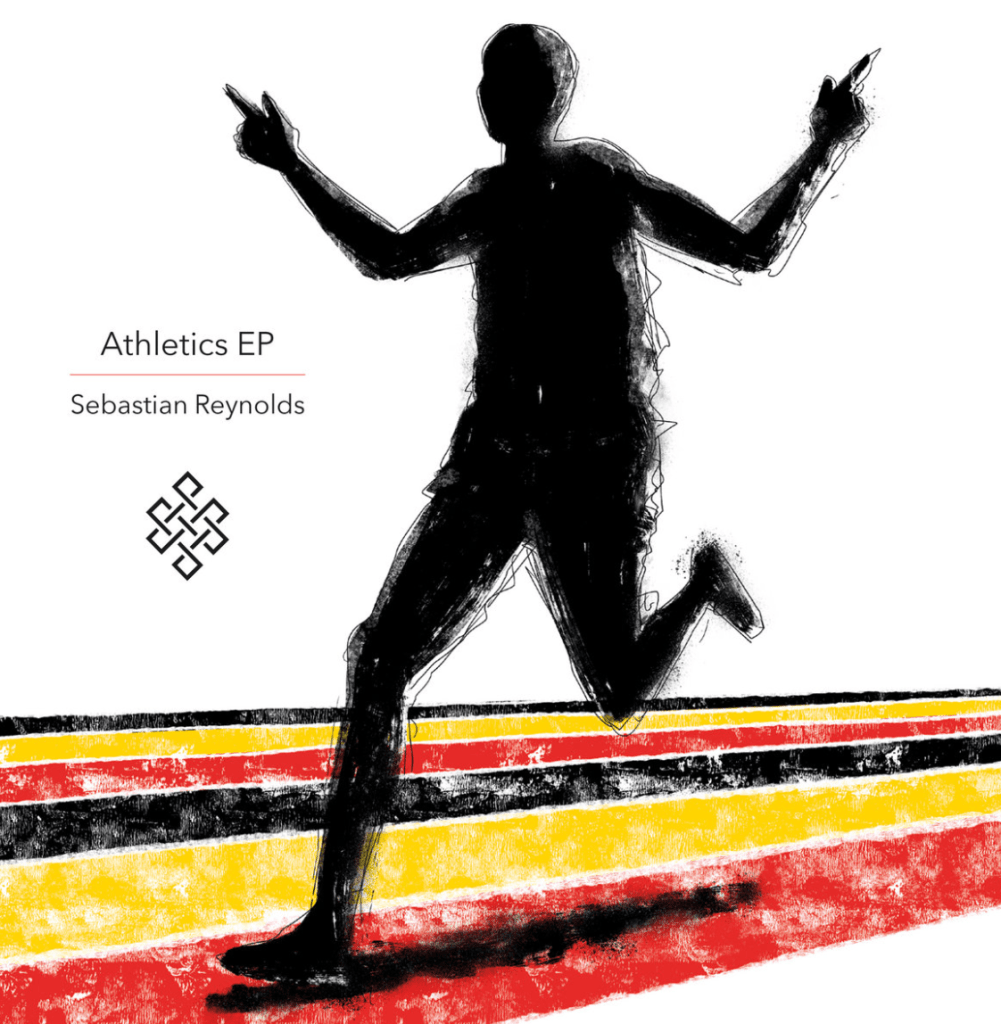
Not that the new athletics-inspired EP from serial polymath Sebastian Reynolds isn’t a motivator and driver, but you probably won’t be hearing it anytime soon pumping out of your gym’s speakers, or used in conjunction with the fireworks, pyrotechnic glitz of modern sport, as athletes emerge from the tunnel onto the track. No, for this is a far more layered, sophisticated set of electronic evocations to keep the loneliness of a middle-distance runner at bay.
Seb both celebrates and scores the euphoria, pressures and pains of running at an amateur and professional level on his latest labour-of-love project. As a blossoming runner in his own right, he combines his two greatest passions to create a sympathetic and subtle race through the emotions and trails. Athletics hasn’t always attracted the most nuanced of soundtracks. Lucky to have been front row at a number of championships myself, I can testify that it’s mostly all EDM and bombastic rubbish.
Vangelis had a good crack at it, thought admittedly for another age entirely, the dawning of the modern Olympics, with the onus on track and field. The score for Chariots of Fire remains the benchmark, and it informs, to some degree, at least one of the EP’s bookended world record breaker paeans, ‘Four-Minute Mile’. In tribute to the patron saint of middle-distance runners, Seb has transduced Sir Roger Bannister’s 1954 record breaking run – achieved really more through science, strength of mind and character, as our Rodger didn’t even train that thoroughly, balancing his amateur running credentials with a career as a neurologist – into a short electronic suite; part atmospheric broadcast, part dreamy synthesized joy.
Leap forward sixty plus years and it’s the Ugandan superstar Joshua Kiprui Cheptegei’s 5000M world record beating run that Seb turns into a swimmingly warm, almost semi-carnival celebration of human endurance. Paying certain homage to Cheptegei’s African roots the versatile acclaimed ‘reeds man’ Peter Fraser plays a semi-modern Afrobeat suffusion of sax whilst former Guillemot Grieg Stewart follows suit with vague African clattered drumming. It’s all actually quite club-y, quite trance-y too.
In between those two giants of the sport there’s a succession of dub-y electronica motivations, build-ups and workouts. Spurred on, ‘Final Push’ has a drive and motion, and a real sense of gravitas (even mystery): a struggle against the body’s fatigue, muscle aches and those burning lungs. ‘Dominance Hierarchy’ with its electro kinetics, knocking drums has an air of both Sabers Of Paradise and Boards Of Canada, whilst the gong resonated, mid-tempo swim ‘Hammering’ reminded me of The Future Sound Of London and southern dub Clap! Clap!
Seb quantifies the rush, the pulse, and expectations of his passion without slipping into the superficial exuberance of EDM bombast. Stereotypes are more or less missing from this athletic purview. This would make a great series of soundtracks for sporting documentaries, highlights. BBC Sport needs to get on the blower to our Seb now.
Flat Worms ‘Live in Los Angeles’
(Frontier Records) 13th May 2022
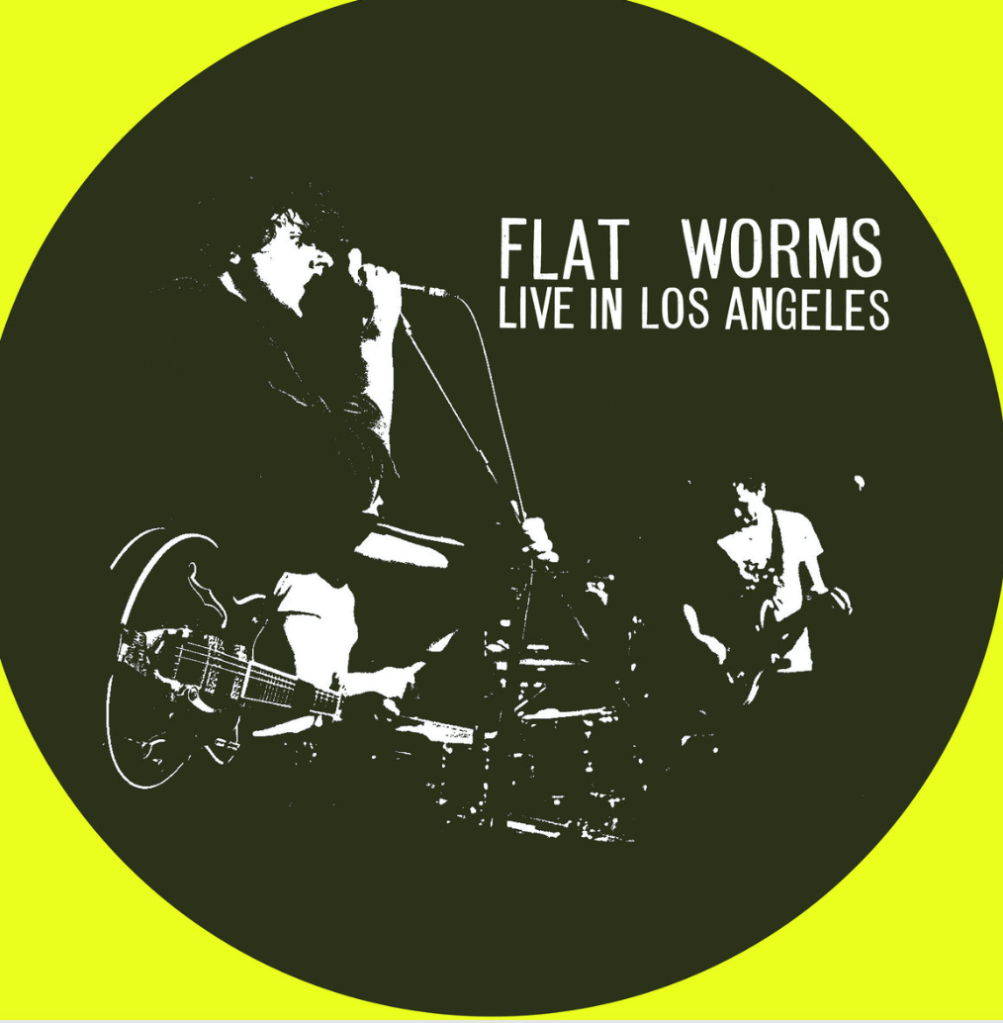
As introductions go, this smash and bash (but very much controlled) driving live showcase from L.A.’s garage-punk trio Flat Worms proves a compact baptism of fire. You could say it has roused my interest.
Admittedly I’ve never come across this tumult before now, so have no idea how the originals sound. I’d imagine the torque, grind, sustain and dynamism is ramped up with adrenaline, and is “in the moment” as they say. Though it has of course been recorded for posterity, hence why this isn’t a live review but a ‘live recorded’ album one instead.
Still, as live records go it’s a lively scowled, crescendo-packed, screwy and heavy trebly-loaded surge; a high velocity hammering of King Gizzard, Electric Eels, The Croissants, Salem Trials, The Damned and Ty Segall. The latter is hardly surprising considering the trio of guitar/vocalist Will Ivy, bassist/vocalist Tim Hellman and drummer Justin Sullivan have previously recorded with that singular talent at his home studio: Hellman has even been a Segall wingman at times.
We now pause for a succinct background check. Between them, members of this congruous L.A. union of garage, drudge-rock, punk and post-punk attack have played with Kevin Morby, The Babies and the Oh Sees. They formed this tight unit back in 2015 though, going on to release a clutch of singles, EPs and two albums, some, as I’ve mentioned, recorded at Segall’s HQ. In more recent times Steve Albini’s sat in that engineer’s chair: one hell of a vote of confidence boost.
They now make an impressive debut on the ‘seminal punk’ operators Frontier Records with this live demonstration. And just like all the best punk-garage records it both blasts and stutters through a short set: no breaks, just a couple of acknowledgments to the whooping, egged-on and goading (in the best possible way) audience.
It’s a thrashing, distorting yet melodic performance; sometimes like a butchered Modern Lovers ‘Roadrunner’, or a Heartbreakers turn at CBGBs. There’s a song in every performance, a tune that breaks out of the seedy back alley kickings and gnarled fizz. Neither dark nor a joy, this Zebulon gig is a great night out spent indoors, with the volume cranked up and curtains drawn. I look forward to now acquainting myself with the lads back catalogue.
Francesco Lurgo ‘Sleep Together Folded Like Origami’
(Bosco Rec.)
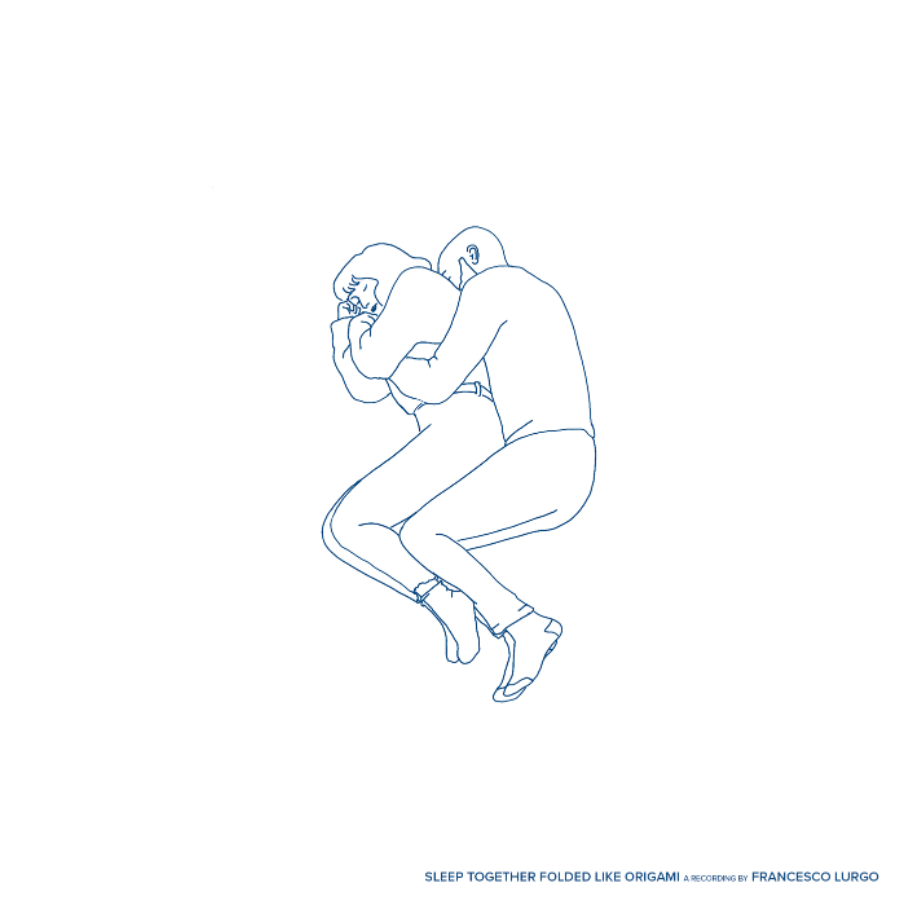
Nothing quite concentrates the mind nor offers an unwelcome window of enforced reflection like a pandemic, especially one that grinded society to a standstill. Forced into confinement, with face-to-face socializing restricted like never before, many of us either broke down or found a distraction and chance to connect with life’s simpler pleasures. In the case of the Italian musician/artist Francesco Lurgo that was an exploration of the ideas of intimacy.
As a mood board that’s both a celebration and search of that intimate theme, Lurgo’s debut solo album is an atonal, sonic and stirred-up account of ambient, neoclassical and electronic suites. Formerly one half of the FLeUR duo, the now uncoupled Lurgo voyages through varied states; a flux of emotional pulls, draws that are backed up by literary and artistic sources, inspirations. The album’s title itself, Sleep Together Like Folded Origami, paraphrases an excerpt from Sally Rooney’s Conversations With Friends novel, and the artist Aurora Bertoli reflects the same motif of that sleepy realm of togetherness on the album’s sleeve.
Sailing through these emotions and nocturnal symbols, Lurgo’s ship drifts upon the rocks to the sound of an atmospheric fog and wafted vapours on the album’s penultimate timed ominous beauty ‘One Moment Before The Shipwreck’. As a couplet, recorded a minute later, the final suite has a disorientated feel of cut-up reversals and pieced together perspectives, memories. With shipping analogies, cast adrift metaphors of finding solid land, something less veiled and hidden, the rest of this dreamy swell and synthesized purred, rippled textured album evokes hints of Simon McCorry, Rhomus Index, Andrew Wasylak and on the light tubular score, ‘Carnation Bloom’, Vangelis.
Metals, low horn-like drones, a pressing slackened high piano note or two, a sense of gravity and depth, reverberations and subtle use of strings are all used to convey the languid, comforting at times, longed and cerebral nature of the album’s themes. Those origami folded comforts, embraces and thoughts ride out the stresses of the pandemic and signal an interesting, creatively enquiring start to a solo pathway.
The Social #66: The Eclectic Cross-Generational Playlist: Funkadelic, Clap! Clap!, Klaus Schulze, Farhot…
May 16, 2022
PLAYLIST/Dominic Valvona

The Monolith Cocktail Social playlist flips back and forth across time and over borders to bring together music and sounds untethered by themes, trends or clique mindsets. Well, to a point. We do however celebrate the albums reaching particular milestones each month. The Social #66, which could be considered the blog’s radio show, includes 50th anniversary nods to The Beach Boys, moonlighting under the Carl And The Passions, much-undervalued ’72 classic So Tough, plus choice tracks, songs from jazz deity Ornette Coleman’s symphonic opus Skies Of America and the switched-on, riled and political-funk orgasmic Funkadelic’s America Eats Its Young. Fast forward a decade or two and Gang Starr’s era-defining Hip-Hop totem Daily Operations is thirty years old this month. Unbelievably so is Stereolab’s Peng, which also features in this month’s playlist.
We had to mark the loss of the kosmische progenitor, cosmic courier Klaus Schulze, this month, and so have a smattering of peregrinations, drifts and score’s from across the German innovator’s back catalogue to enjoy.
Bang up to date, there’s a multitude of tracks that we either missed or didn’t get room to feature on the monthly playlists, including Sinead O Brien, Clap! Clap!, PENDANT, Modern Studies, Nathan Francis, Farhot and Rancho Relaxo.
Expect to hear anything and everything curated in one aural journey of possibilities, open-mindedness and discovery.
THOSE TRACKS IN FULL ARE:::
Clap! Clap!, Domenico Candellori, TOROZEBU ‘Ox’
Dakh Daughters ‘I Want’
Jackson Heights ‘Mr. Screw’
Smokey Haangala ‘Amafuna Kanyama’
Front Page Review ‘PRISM FAWN’
Close Lobsters ‘Just Too Bloody Stupid’
Sliver Car Crash ‘Curse In The Pines’
Sinead O Brien ‘GIRLKIND’
PENDENT ‘Thom’
Camu Toe ‘Death’
Funkadelic ‘If You Don’t Like The Effects, Don’t Produce The Cause’
Ill Considered ‘First Light’
Klaus Schulze ‘Weird Caravan’
Stereolab ‘Mellotron’
Tess Parks ‘Happy Birthday Forever’
Sven Wunder ‘Mosaic’
Klaus Schulze ‘2. Satz: Gewitter (Energy Rise – Energy Collaps)’
Grindolog ‘Ship’
Nathan Francis ‘Premonition’
Larry Ridley ‘Go Down Moses’
Ornette Coleman & The London Symphonic Orchestra ‘The Artist In America’
Robbie Basho ‘Eagle Sails The Blue Diamond Waters’
Black Light White Light ‘Epilepsy’
The Beach Boys ‘Hold On, Dear Brother’
Guilherme Coutinho ‘Me Ver Em Vocé’
Alice Clark ‘Don’t Wonder Why’
Eugene Viscone ‘Love’s Hidden Island’
Baeshi Bang & Ip Koa Son ‘Kang Kang Sullae’
Gang Starr ‘Soliloquy Of Chaos’
Nine ‘Whutcha Want’
Farhot ‘Rap e Dari’
Laundromat ‘Combo’ Klaus Schulze ‘Rhythm Fugue’
Idrissa Soumaoro ‘M’ba Deri Ou’
caroline ‘Dark Blue’
Modern Studies ‘Wild Ocean’
Klaus Schulze ‘The Treasury Of Thy Lusty Days’
Sāo Paulo Underground ‘Perenquén’
Rancho Relaxo ‘Colour The Stars’
Crystal Syphon ‘Try Something Different’
ALBUM REVIEW/MATT OLIVER
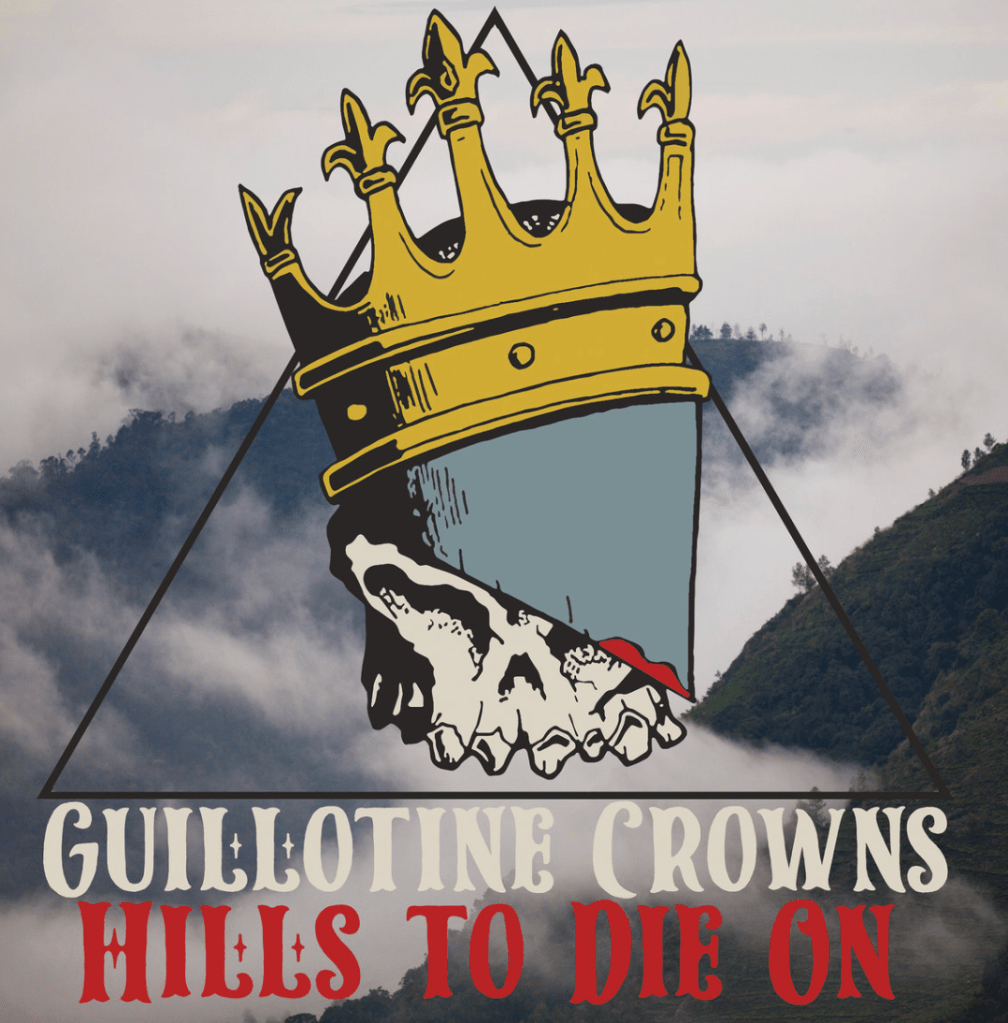
Guillotine Crowns ‘Hills to Die On’
(Uncommon Records)
Do not read between the lines: these crowns haven’t been made to sit comfortably atop underground sovereigns. Hills To Die On is an uprising as well as an upholding of 80s-made disaster, predicting a New York-Chicago futurism that’s actually right under your fingernails, dirt and all. In orators Uncommon Nasa, whose clipped bravado, capable of coiling ad infinitum until he’s constricting your windpipe, and Short Fuze, no less strident but a case of always having to watch the quieter ones in times of distraction, Guillotine Crowns fuck up the b-boy stance and the front rows they’re liable to jump into. Dystopia may be the easy catch-all term to apply to this album of margin-ignoring hip-hop, and these are no gilded garlands on display; but when added to its deeply rooted survivalist spirit, just being without ever seeking hero status, Hills To Die On becomes music to spray skyscrapers by.
As with the Monolith Cocktail-approved, 2019 Uncommon Nasa project City As School with Kount Fif, indie/leftfield hip-hop titans Company Flow and Cannibal Ox, both of whom are referenced in rhyme, are where yardstick parallels are drawn and which give the album a weird throwback status caught in forward thinking-retro fantasy-modern living crossfire. Throw this back to times of Anticon/Def Jux etc (in which Nasa earned his stripes) and you’re hopeful for the scene all over again, thrilled by the likes of ‘Horseman Armour’ and ‘Scope of the Guillotine’ spewing out abstract angles hiding as straight lines and taking no shortcuts in unseating speakers.
The duo recognise the need to mobilise, but also the parameters of the friends/enemies axis. Whereas the resistance of ‘They Can’t Kill Us All’ is comparable to an all-for-one zombie outbreak, ‘The Product’ has Guillotine Crowns accepting the Sword of Damocles as both potential sealer of fate and a means of going for self amongst online/media minefields. Dense, dry and pretty unforgiving without being indecipherable, GC embark on “around-the-clock stakeouts to reset history” with enough ear catching references – Pelle Pelle sweatshirts, shouts to EPMD, Wu-Tang, DOOM and “Flava Flav with the 12Gauge” – to ease furrowed brows. The pertinence of their streams of consciousness will eventually emerge like a word balloon, forced into your eyeballs as a revision of the Clockwork Orange syllabus.
“My life is fast forward, while yours is a series of pauses” says the crushing headswim of ‘Rebel Crowns’, proposing the question of “do you want to be right, or do you want to be correct?” that through the wrong mic would just be look at me-level pretentious. And like any hip-hop act, underground or mainstream, the pair know the worth of a good hook that punters can take as gospel or make a tattoo of, acknowledging rap’s saviour-like status on the come up and pledging allegiance to the grind. The two leaders are joined on the mic by a bunch of street corner-dwelling savages slash town criers – Jyroscope, Duke01, Gajah, Tracy Jones, Skech185 a sometimes improbable cross-section of survivors and reinforcements to reroute the tide.
The sound of everyday anarchy is dominated by drum machines bullying backdrops like they’re about to cause the 80s music scene to splinter. Guitar chords are crowbarred if not sawn off, and holographic, peace-seeking synths become something more gothic and sinister, analogous to arcade machines becoming sentient. The programming of effects and percussion make tracks itch, irritating your inner ear. ‘Art Dealers’ sounds like ‘Brooklyn Zoo’ in a backpack. The scarily beautiful ‘Generosity’, with its damning hook sample, sounds jettisoned in space, while providing rhymes for the ages that measure the distance of returning to reality.
The dissonant ‘Bare Hands’ projects a robot uprising with the metropolis as its playground, whose hook of “I will destroy you with my bare hands…my power is limitless, you can’t come close to stopping me” both boosts and belies its Gotham-like setting, with ‘Hills’ providing a triumphant, comic book-coloured sci-fi fanfare and a chorus to leap headlong into for anyone needing a new manifesto. Rarely does the Hills… have time to check its pulse across 46 minutes; ‘Tape Deck’ tries to act dreamy, but can’t get no sleep. The industrial grind of ‘City Breathing’ is made for tank-as-low rider, and ‘Killer’, with Short Fuze calculating villainously, reaches the apex of the album’s claustrophobia living in a police state.
Hills To Die On is classic anti-socialism in the shock-of-the-new, ghettoblaster on full blast sense, though suffering the establishment, rather than just being anti-establishment, seems to be the Guillotine mindstate. All hail the Crown rulers setting standards from home to the Terrordome.
Our Daily Bread 517: Ali Murray ‘Wilderness Of Life’
May 11, 2022
ALBUM REVIEW/GRAHAM DOMAIN
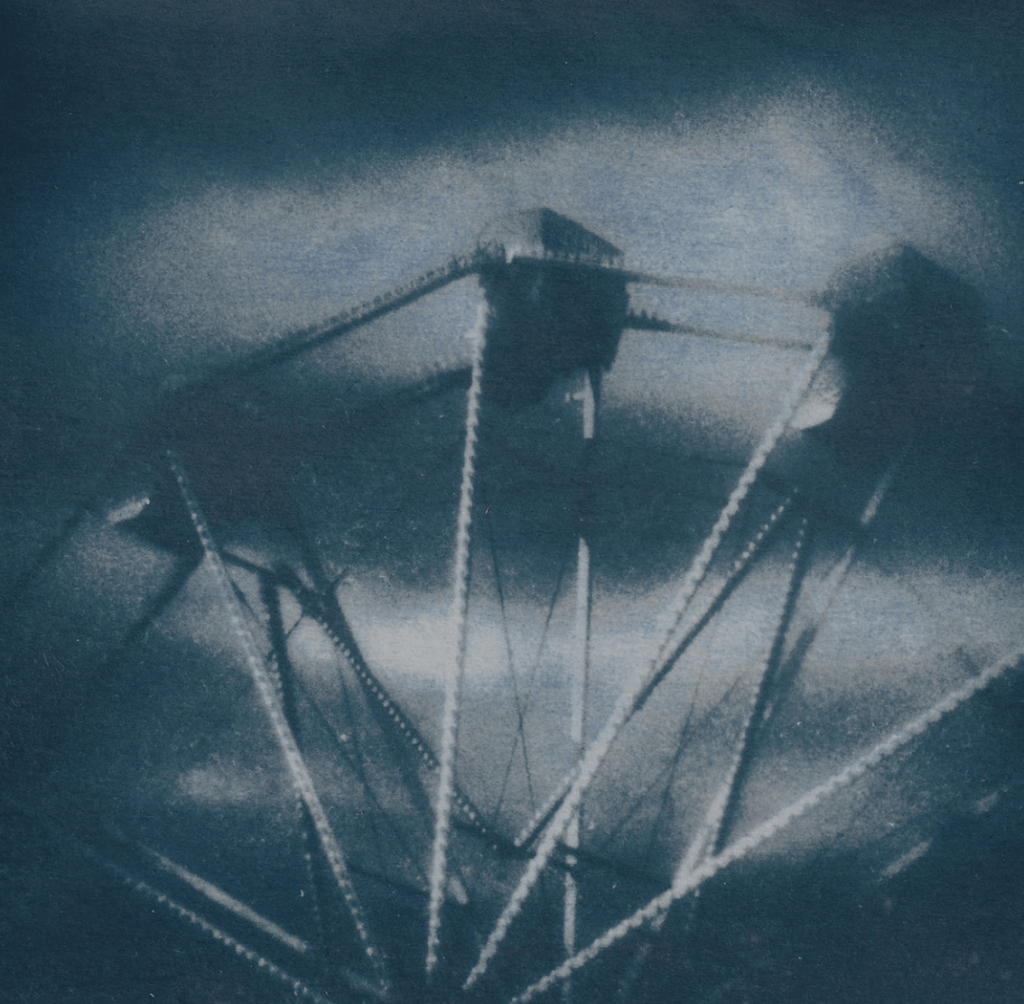
Ali Murray ‘Wilderness of Life’
(Dead Forest Records)
Wilderness Of Life is the new album by Ali Murray, out now via Dead Forest Records. It is an album of Dark Intense Folk Pop with intermittent Shoegaze guitars. The songs are full of imagery, nature reimagined as pain, the loneliness of the Cosmos painted in sound on a skyscraper guitar.
His voice lies somewhere between Tom McCrae and Simone Felice with nods to Elliot Smith. The songs are dark hymns to loneliness, heartbreak, and emotional turmoil, with enduring hope in the face of adversity.
Songs such as ‘Wilderness of Life’ and ‘Rainbox’ point the way forward – the words brought to life with intense effect laden guitars akin to Slowdive or Big Flower. In this setting he could become a cult hero, a modern-day Elliot Smith painting his pain not just with words but also with emotion as sound. One to watch!
Our Daily Bread 516: SAULT ‘Air’
May 9, 2022
ALBUM REVIEW: Andrew C. Kidd

SAULT ‘AIR’
The summit has been reached. The artist is left poised precipitously on a creative aiguille. There is no higher peak. There is no ground left to conquer. Only true sky-reachers seek higher heights. I have no doubts that SAULT, aka Dean Josiah Cover, was pointedly tiptoed in such a place prior to writing AIR.
Reality is operatic. Cyclical pulsing strings belly staccatoed and libretto-less choral notes. They oscillate beautifully. The scale is pentatonic and it floats. The string section gallops. I am reminded of Phillips Glass’s Akhenaten. This is theological Richter.
On Air I am nonchalantly oaring my sky-canoe through wisps of clouds and the dreamy blue. Its jazz strings provide buoyancy. The slow ride rushes glisten as I traverse hazy white into breezy clearings. The mono mezzo-soprano is heat-haze. The sun-glittering percussion touches the tips of waves of the old world below. The piano – a familiar friend – is a subtle hand that lets me go. My canoe slips away into the polychromatic, undulating on brassy ascents and descents
Harpy Heart is all pizzicato. The opening melody is the foundation of somewhere where we lived long ago. The glockenspiels are the brickwork of houses. The ascending brass are the hearth fires of stone. There are Gerschwin crescendos: we climb the stairs of this dwelling by way of the feather-light chorus. The house is eventually made roofless by the vocals that simply spill out to kite around the playful strings. The ascent begins.
The long synths of Solar hold and hold and undertow the cycling chorus. The horns are thrust bursts. The wind section is heraldic. Glockenspiels glint and shimmer and pulse. Chords are stacked fifths; their forward motion could move moons. The brass provides volume and strength. Future rhodes, theremin magicry and analogue pads lead into a grandstand choral finish. This is Alexander Courage conquering deep space in the ‘60s.
Time Is Precious is Bowie-falling-back-to-earth melody. Think cosmic kaleidoscopes. Think starry sequins. The brass is Aaron Copland: pioneer-spirited, triumphant, enduring. The neo-soul vocals – casual reminiscence of previous SAULT – make an appearance at the mid-point of this piece. They sing of the most elusive and untradeable of currencies: time.
On June 55 I am peering into the novel, the fantastical, the new worldly, the shimmering brilliance of a future time. I am at home. Advancing brass and reverse-tape sequences disorient me. Quietude follows. Warmer, fuller, sun-laden horns melt into rhythmic trombones and deep sprechgesang melody. It is a sort of gentler David Shire, with a choir and zithers.
Luos Higher is a sonic smoke signal. I enter somewhere akin to Andreas Vollenweider’s Caverna Magica. A thumping, all-tribe dance ensues: feet tread to an interplay of pizzicatos. The synergy is Crosby, Stills and Nash, except they are playing erhus, guzhengs and sanxians. It is communicating something that I cannot comprehend yet. I am on a higher plane. I am left truly at peace.
Back on the aiguille. AIR places its listener on a mountaintop observatory. The lens is a long one. It telescopes towards new sounds. It is mesmeric. It is circuitous. It never meets in the middle. Through its prism I eye optimism. Through this lens I can celebrate future times.
Dominic Valvona’s Roundup

The Shorts (videos, tracks, singles)
Stephanie Santiago ‘Activa Tu Cuerpo’
(Movimientos Records)
Soulfully lucid with a tinge of jazzy R&B and a reverberation of Cumbia, the London-born ‘Colombianx’ burgeoning sensation Stephanie Santiago entrances with another vision of her Latin roots. Growing up as the daughter of Colombian musician parents – her father an accordionist, her mother a singer –, in a home filled with the joyous, sauntering music of South America, Stephanie embraced the ancestral vibes but lent them an expanded eclectic mix of sounds: from soul to jazz, reggaeton and even punk.
Via the Latin contemporary Movimientos Records label, Stephanie continues to find her place, sense of community in the bustled melting pot of London. From the Alma Carnavalera EP, and most recent single, the Monolith Cocktail is spreading the good word and happy to share the funk-dripped bass and dreamy rich ‘Activa Tu Cuerpo’.
Celestial North ‘When The Gods Dance’
A magical, softened driving gallop over Celtic folklore and hillsides, the diaphanous voiced Celestial North dreams big, dancing with the gods, on her new enchanted and cinematic swelled gauzy single. From our side of the border here in Scotland, but based in the splendor of the Lake District, the soloist counters turbulence and drama with atavistic veils from a mythology to create a whole new entrancing fantasy.
Orryx ‘Ifera’
(ZamZam Records)
The titular evocation from the Bristol-based artist Christelle Atenstaedt’s new EP, ‘Ifera’ sounds like it’s been woven from the ether. As a repeated chime rings out suffused atmospherics envelope a yearned vocal. Materializing from the vapours, a trance-y beat finds a sort of traction and drive. Under the Lovecraftian guise of Orryx, esoteric and Byzantine stirrings draw the listener into a slowly powerful world of gothic-pop and electronica.
Christelle combines ethereal vocal loops with a selection of hardware synths, samplers and effects pedals on the EP’s quartet of original tracks – the fifth being a remix from dark wave techno duo Fever 103°. Delve in, and succumb to the mantric powers of this hypnotic artist.
ALBUMS/EPs
Black Mango ‘Quicksand’
(Gusstaff Records)
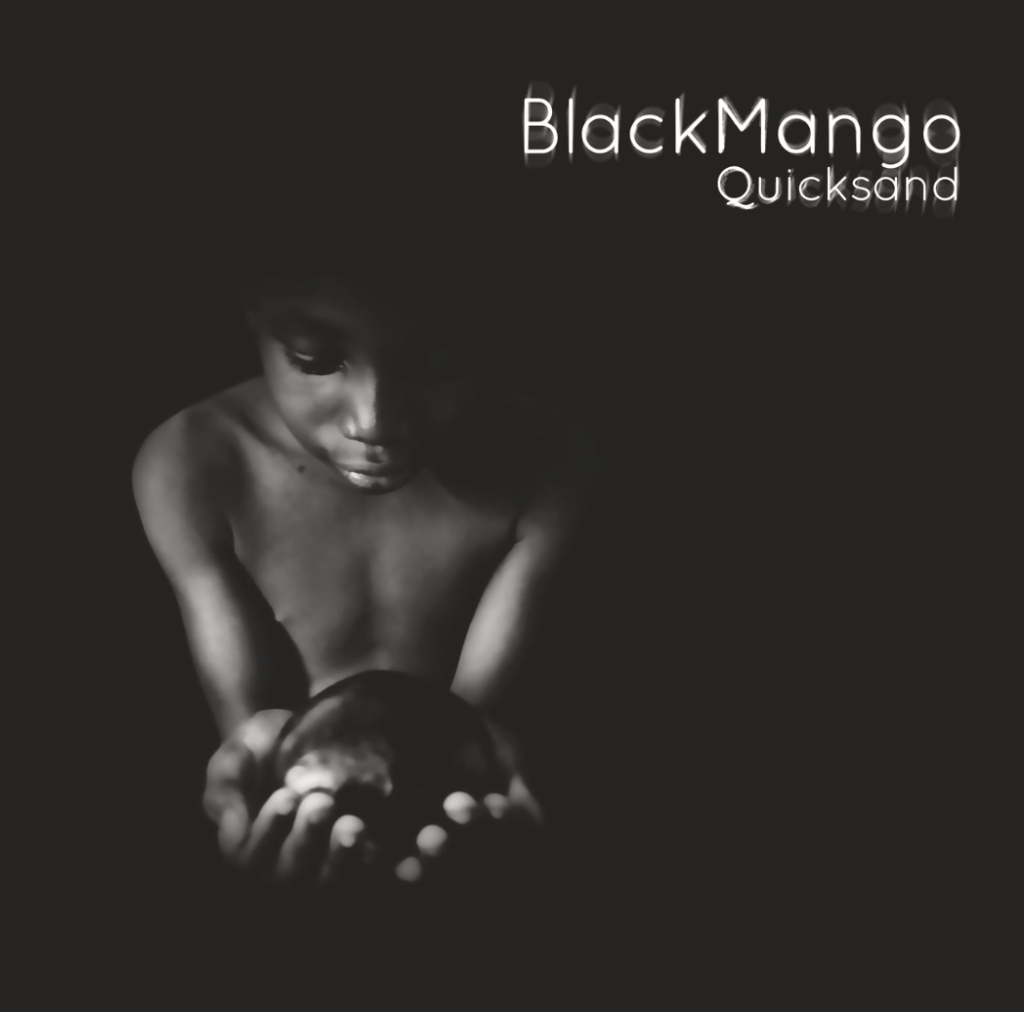
Transforming Mali’s world-renowned signature blues sound – from the city streets, back lanes of the Bamako capital to Tuareg roaming desert regions – the visionary producer Philippe Sanmiguel has been instrumental in fusing that sound with rock music, atmospheric mirages and electronics.
Based in the capital for the last sixteen years, Philippe has amassed an enviable roll call of productions for such icons and talents as Samba Touré, Anansay Cissé, Tartit and Mariam Koné. During that time he’s enjoyed a creative partnership with the Glitterbeat Records label and its founding partner Chris Eckman. Alongside his foil Hugo Race (who appears on this album), Eckman’s Dirtmusic band was drawn to Mali a decade ago, recording sessions for both the Troubles and Lion City albums whilst in Bamako with Philippe.
An integral part of the scene then, I’m guessing it didn’t take much persuading to get most of those artists to appear on his new showcase, Quicksand.
Under the Black Mango alias, Philippe opens up his own compositions to the great and good of Mali, and admirers alike. Produced over several years in various recording sessions, each collaborator has been given “free range”. The results of which are equally as searching as they are dreamy: even hallucinogenic. The opening heat bending, dub-y ‘Bakeina’s Dream’ straddles both; melting in a desert setting as the earthy soulful vocals of Bocar Sana Coulibaly drift through from some mirage oasis. Bocar, a member alongside Ali Traoré (both also nephews of the late esteemed Ali Farke Touré) of Espoirs de Niafunké, makes a second appearance later on, joining the brilliant guitarist and artist Anansy Cissé on the meandered, spoke-plucked and gauzy ‘The First Stone’.
Pretty much one of the most popular and gifted guitarists to emerge from Mali, Samba Touré adds a sustained flange of bended notes and expressive lines to the Phantom Band meets Belgium alt-rock ‘Are U Satisfied’ – Philippe’s voice on this one almost channels Michael Karoli of Can’s languid lyrical, questioning malaise. Samba plays some nice electric-blues and semi-classical tones in harmony with the mandolin and harp-like airy spirals of the ngoni on the infinity ether R&B flavoured ‘Mad Girl’. Offering up the R&B, the soul on that same track is the celebrated Malian songstress, music teacher and Les Amazons d’Afrique super group member Mariam Koné. Mariam can also be found lending a searching cosmic gospel vocal on the Flyodian, astral and progressive tumultuous ‘Minamba’.
From Samba’s regular band setup the ngoni and tama (a hour-glass shaped talking drum, the pitch of which can be tuned mirror the human voice) maestro Djime Sissoko gets to let loose on the percussive heavy, spacey ‘Bankoni’. With buoyant drums, bottle taps, ricochets and buzzes this scrapped and scuttled finale marks a mysteriously veiled ending to a Mali traversing psychogeography of both magic and the all too real consequences of the violence that’s plagued, and continues to plague, the country and its borders.
Talking of those fraught, violent themes, the already mentioned Hugo Race moodily channels his Dirt Music calling on the bleeding ‘Heaven Sands’. Part swamp gator blues, part outback Mick Harvey, Hugo leads us across a much troubled, metaphorical landscape towards better days. Though Philippe’s dub-y, Terry Hall-like ‘Quicksand Blues’ has far more ominous, political references to a desert storm of terrorism, immigration and blood-soaked sand dunes. ‘Ghost Sand’ meanwhile is just that, an instrumental passage of haunted lingers, traces of those both missing or forced to abandon the deserts of Mali for the cities; out of displacement, conflict or poverty.
There’s a far greater talent pool involved on this album, which transcends Mali’s extraordinary legacy as arguably one of the true homes of the blues and rock genres. Quicksand marks a sagacious yet experimental achievement for the producer-musician and artist in his own right. A showcase for his own talents, his friends and for the country itself; roots music taken to another level and given a contemporary lift.
Further Reading::
Private Agenda ‘A Mannequin’
(Lo Recordings)

A sophisticated mood board of veiled, gauzy electronica with hints of real tinkered piano, A Mannequin is the second studio album from Berlin/London portal Private Agenda: the languorous sonic partnership of Sean Phillips and Martin Aggrowe.
Conceptually using each song and shorter breather, pause, to reflect particular character traits, and in doing so, asking certain questions about the ‘dichotomies’ that define us, this duo play around with a soundboard of synth-pop, nu-soul, ambient, downtempo, new age, chillwave, new wave, AOR gold and house music.
A fantasy with spells of starry, shimmery tinkled magic and more hazy, vaporous plaintiveness, this mostly dreamy, relaxed album glides or drifts through twelve degrees of being; starting with the ambient turn, the Air-like mirage ‘Irresistible’. I haven’t made my mind up if this is about holding a mirror up to narcissistic self-love or a complete 360 degrees turn, and in fact dreamily cooing for ore of it.
‘Neo-Nostalgia’ not just a track in itself, could be a perfect description for the whole record, with its constant lingering traces, the essence of 80s songwriter and synth pop, electronica, disco and yacht rock. The duelist ‘Gemini’ seems to lushly brood through Tokyo 80s glowing new wave, the Balearic new age, and yet also fit within the perimeters of the music of the cult Laurel Canyon singer-songwriter Ned Dohney.
There’s a change in musical mood, instrumentation by the fourth lovelorn song, ‘Touching’, which features an eloquent spell of classical light piano. It returns later on with just a hint of distant birdsong and a synthesized pre-set on the interlude-like ‘Purity’.
Elsewhere those floated ethereal vocals – which are never pushed, never sang in anger or even loudly – are wrapped in relaxed funk, castaway tropical percussion, neon-lit drama, opulent gauze and airy filters. With nothing strained, no real tensions, the music glides through a swirl of pre-Miami Vice Jan Hammer, Vangelis, Groove Armada, Spaceface, and on the finale, ‘Substance’, an exotic laidback pan-pipe hint of South American trance: As they’ve coined it, a ‘musical hyper-realism’.
Despite that laidback, even disarming if saddened at times production, the personality is seriously mined to create a fantasy come lyrical expression of who we truly are. A voyage of self-discovery you could say.
Saturno 2000: La Rebajada de Los Sonideros 1962 – 1983
(Analog Africa)

Once more landing on South and Central American shores Analog Africa airways celebrates the obscure ‘Rebajada’ phenomenon with what must be the only, if not first, compilation of its kind dedicated to that trippy, slowed-down form. Originally asked by Analog’s founder Samy Ben Redjeb back in 2010 to come up with an idea for a collection, noted DJ expert Eamon Ore-Giron (stage name DJ Lengua) offered up the Rebajada Mota Mix, which as a real slow-burner took time to reveal its magic. And so more then a decade on, this proposal now sees the light of day on a dedicated 15 track survey, taking in a twenty-one year period from ’62 to ’81.
First though, a little background. In a nutshell, ‘Rebajada’ is a well-coined name that literally translates as ‘to reduce, or to lower’, in this case slowing down the continent’s famous Cumbia and, to a lesser extent, Porro rhythms. Cumbia, a catch-all for a Latin American amalgamation of rhythms and folk dances drawn from the indigenous, enslaved African community and Spanish colonial cultures, and Porro, a style originally seeded in the Caribbean facing region of Colombia that evolved into a ballroom dance played by brass heavy bands and orchestras, are both simmered down with the speed and much of the gallop taken out so as to produce sometimes crazy but often sauntering, more relaxed dances. It’s a sound that allows the listener to drink it all in.
Brought to Mexico by ‘the sonidero’ (sound-system operators as they were known), tunes from Peru and Ecuador were by accident or luck transformed into a new style that sent the audience wild. Two cities and groups of people lay claim to initiating it though. In one corner the catalyst Pereas and Ortegas brothers, who travelled across Latin America crate digging before returning home to Mexico City. They sold their wares, finds to various sound-systems on the hunt for something new and fresh to blow away the competition. A number of which, in trying to match the beats of each region with that of Mexico City’s own styles began experimenting. One such maverick, Marco Antonio Cedilio of the Sonido Imperial fame, created a ‘revolutionary’ pitching system that could slow records down. In the opposing corner, the northern Mexican city of Monterrey and Sonidero Gabriel Dueñez, who by happenstance set in motion a chain of events that would see the city, lay claim to inventing the ‘Rebajada’ style. By escaping electrocution at the hands of a short circuit spark that nearly set his turntable on fire, the revolutions were slurred and slowed down by the damage, playing Cumbia at much reduced bpm and so creating this new rhythm and dance sensation. Another well-known sonidera, Joyce Musicolor, as mediator puts it best: “Rebajada, and the equipment to perform it, is from here [Mexico City] but it was Monterrey that popularized it.”
Contentious to this day, no matter what the truth, a new sound was born that grew and grew, yet remains relatively unknown outside Latin America. Here then is a survey of that scene, with a majority of the songs sounding unlike the originals; notable exceptions being the few classics composed by Polibio Mayorga, or rather the Ecuadorian Junior Y Su Equipo, and the Mexican Los Dinners group’s scrappy, tinny shuffled percussive and giddy-horse canter, bounding drum saunter ‘Sampuesana’.
Although we’ve heard a lot about Mexico, the lion’s share of choice selections are drawn from Venezuela, Ecuador, Colombia and Peru. Well, there’s actually only one apiece from both Venezuela and Colombia; the tremolo quivered Western themed reverberation of Duane Eddy, if produced by Joe Meek, ‘Infinito’ by Hugo Blanco Y Su Arpa Viajera, and the rattle-y percussive chapel squeeze-box, organ stuttered ‘La Danza Del Mono’ by Lucho Gavilanes.
Obviously when taken down a notch of two in the speed stakes it produces some funny as well as odd subgenres, and with the elements of low rent tech makes some tracks sound like 8-bit zappy and warbled versions of Andean pipe music. In that category you can include the oscillating ghost-synth like filtered Ecuadorian Junior Y Su Equipo group’s ‘La Borrachita’ and their second contribution, the googly, high-pitched and fluted ‘Bien Bailadito’.
From Peru, Los Santos’ cosmic futuro entitled ‘Saturno 2000’ (borrowed for this compilation’s title) sounds like a slowed fusion of Porro and Highlife with its raised and suffused blasted horns, galloped hand drums and distinct tropical Latin lilt. Monolith Cocktail followers and Analog Africa aficionados will recognize one name from the list, the Peruvian cat Manzanita. A compilation of his influential music was released only last summer by the label. Here, in a very different guise is his bottle-rolling duet of the slurred ‘Paga La Cuenta Sinverguenza’, and, with Su Conjunto, the more strung-out gangly guitar wondering ‘El Jardinero’.
Back to where it all got so peculiar and relaxed, the Mexican outfit Conjunto Tipico Contreras turn in a shunted, scrappy and concertinaed vision of a epic exotic film score from the MGM studio heydays; a record that has both a mix of the Mayan jungles and fertile crescent. The beat is destined, if not already, to be sampled.
Could Rebajada be the sound of this summer? It’s certainly a contender, just because it’s often so strange and hypnotising. You kind of hear the process, the slowness, yet it works as a sauntering, relaxed yet somehow still busy tropical shuffle. Having constantly documented all the best African nuggets, Samy and his partner on this compilation, Eamon, have put together an essential guide to a Latin American treasure trove.
Ethan Woods ‘Burnout’
(Whatever’s Clever Records)
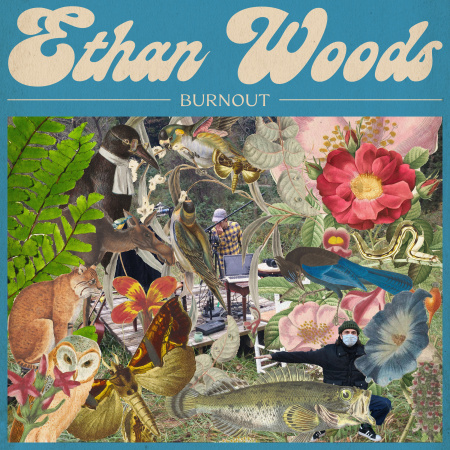
From out of the rustic idylls of Western North Carolina emerges a cabin essence songbook; a disarming pastoral lilted and psychedelic melt of connectedness, and yet, also yearning heartache. Ethan Woods and friends absorbed the meandered thoughts that take shape when disconnected from the newsfeed roll of social media and bustle of the city, out on a summer balm encased porch, and under a wooded canopy.
First conceived back in Brooklyn between 2015 and 2017, Woods fine-tuned his collection of dreamy, mesmerizing songs when he moved to Asheville, North Carolina a year later. Created in-situ at the foothills of the Appalachians, but brushed-up upon returning to Brooklyn once more with added parts recorded at the now defunct Fort Briscoe during the pandemic, the fruits of Woods and his sympathetic ensemble is let loose just in time for the summer of 22.
From beginning to end Burnout unfolds over the course of a day, following the sundial’s shadow until nightfall drops. That’s when the nocturnal soundscape collage, performed in part by the electronic experimentalist Aaron Smith, opens up a whole new evocation of nighttime camouflaged hoots, insect chatter and an Americana ether of obscured sounds.
Apart from Aaron there’s contributions from Woods partner Lauren Gerndt, percussionist Matt Evans, Trevor Wilson, Sarah Goldfeather, Finn Shanahan, Karl Larson, Jude Shimer and Alvin the rooster. Yes that’s correct, a credit goes to the rooster, who sets the alarm and atmosphere. No contribution is too small: from Gerndt’s read out one-liner about teddy bears to helping in the development of the arrangements themselves.
In the press notes, as an ample description, we’re told to think Alan Lomax recording a super group of Sufjan Stevens and The Books. I’d suggest led by David Byrne with Paul McCartney, Animal Collective, Galaxie 500, Ladybug Transistor and Clap Your Hands And Say Yeah vibes. In all, a sort of ebb and flow of psych, troubadour, soft rock and enervated dirt music country.
Characters from childhood, like ‘Mrs. Moo’, are accorded a lo fi swim of the sentimental and playful, with humble spells of honesty. Never quite straight up, always melting in with the arable outdoors on waves and oscillations of marching drumbeats, cymbal splashes, distant snozzles, tinkled piano and lax acoustic guitar. Music finds form and a rhythm; an either melancholic or romantic emotive tune in untroubled and unguarded song forms. Most of which bleed into each other, almost like a continuous recording.
Woods pastoral retreat proves a most magical, heart rendering, if sometimes pining, place to spend an hour or two. I’m really impressed by this slow-burning trip that drops The Books off for the weekend in a log cabin for a soliloquy session of candid therapy.
Misha Sultan ‘Roots’
Gustavo Yashimura ‘Living Legend Of The Ayacucho Guitar’
(Both Hive Minds Records) 6th May 2022

Nearing the label’s fifth anniversary (see my future purview celebration later this year) with no signs of flagging, Hive Mind Records are stepping up with two releases on the same day. Both cassette and digital albums couldn’t be more different too; with organic and global electronica from the Russian artist Misha Sultan and Peruvian Andes guitar evocations, flourishes from the Ayacucho-imbued maestro Gustavo Yashimura.
It shouldn’t really be that surprising, the eclectic richness of this dual release, as the label has previously traversed an electric Atlas Mountains, celebrated the colourful rituals of Gnawa music, and stopped over in Java, Highlife Western Africa and tripped out with the Acid mothers and Reynols.
The first of these showcases brings together the work of the multi-instrumentalist Misha Sultan, collecting pieces from 2015 to 2022. Hailing from the heart of Siberia, and industrious city of Novosibirsk, Misha was forced to leave his homeland.
The so-called ‘Chicago of Siberia’, on the banks of the Ob River, a crossing point of the legendary Trans-Siberian Railway and historically an important flashpoint of the civil war, informs, inspires some of the recordings. A geographical behemoth that sits between the Ural Mountains and Northern Asia, touching the Pacific Ocean in the East, Siberia isn’t just the exiled, infamous hardened remote atelier of literature, art and politics but a beautifully diverse landscape; the Eurasian melting pot as it were. Mirroring that diversity, Misha’s music travels to the Congo, Bali and Arabia whilst absorbing bits of kosmische, ambient, trance, washed-out psych, 90s chill-out, breakbeat and dub.
Real instruments, such as bubbled and shuttled mallets, flighty and dreamy flute and bamboo and metal percussion melt into synthesised waves, rays and atmospherics; some of which, on the odd track, are provided by the mysterious Mårble and Dyad. ‘Ant Invasion’ sets the tone, the scene, with a peaceable-like meadow field recording of hedgerow birds and tranquil washes of Mythos and Andrew Wasylyk. A shuffle of hand drums kick in and vague Ash Ra Tempel prompts take us towards more far eastern fringes. ‘Sand Ashram’ wobbles and bobs to Richard H. Kirk’s red sands invocations, Warp Records early Artificial Intelligence series, Banco de Gaia and the chill-out vibes of Liquid and William Orbit. ‘Why Are We Here?’ meanwhile could be either set in an Finis Africae vision of the Amazon, or indeed, Western Africa, whilst the railway station inspired ‘Beloostrov’ offers a fluted and drifting piano daydream aboard a train bound for the Finnish border. ‘Slow Flow’ with its shooting stars and whistles floats into spacey dub Orb territory, and the banjo-like radiance of ‘Bubbles’ moves from Indonesian evocations to Japan; well, something like that.
The final two tracks journey to the Congo and Bali; with the latter settling into a meditative mood amongst the New Year celebrations of the Balinese day of Silence.
Misha sonically travels the world, bringing together interesting references, emotions and atmospheres. He remains however rooted, connected to that Siberian topography and mood.
The second showcase of the Hive Mind set this month assembles a collection of adroit but also intensely skillful acoustic guitar music by the rather obscure champion of the Ayacucho Peru culture, Gustavo Yashimura.
Picking up the guitar in 1987, Gustavo travelled onto Uruguay to study, later on journeying to Japan where he played a classical style. He’d return home however in 2004 (still eager to learn and study) and would later take up the Andean style of guitar with the onus on the proud Ayacucho region of Peru. His teacher during that period was the 80-year-old veteran Don Alberto Juscamaita Gastelú, known famously as just Rahtako. It seems Gustavo learned much; straddling both the classics and more frantic modern styles.
In trying to reclaim the pre-colonial Spanish Ayacucho folklore and culture, these nimble and busy performances incorporate an age-old yearn.
A number of tracks (‘Dandé Te Fuistes Paloma’ and ‘Negra Del Alma’ being two of them) feature a heartening, aching female vocal: not quite Fado, but certainly on the lamentable side. Beautifully sung, expressive, they prove my particular highlights on this compilation.
Gaucho western horizons, ancient symbols on the plains, romantic flourished and dalliances stream forth from an incredibly fluid style; a mix of Spanish and the indigenous. Dainty, sizzling, blurry at times, Gustavo’s skills prove magical. Well worth adding to an eclectic collection. Better still buy both albums.
Ghost Power ‘S-T’
(Duophonic Super 45s)
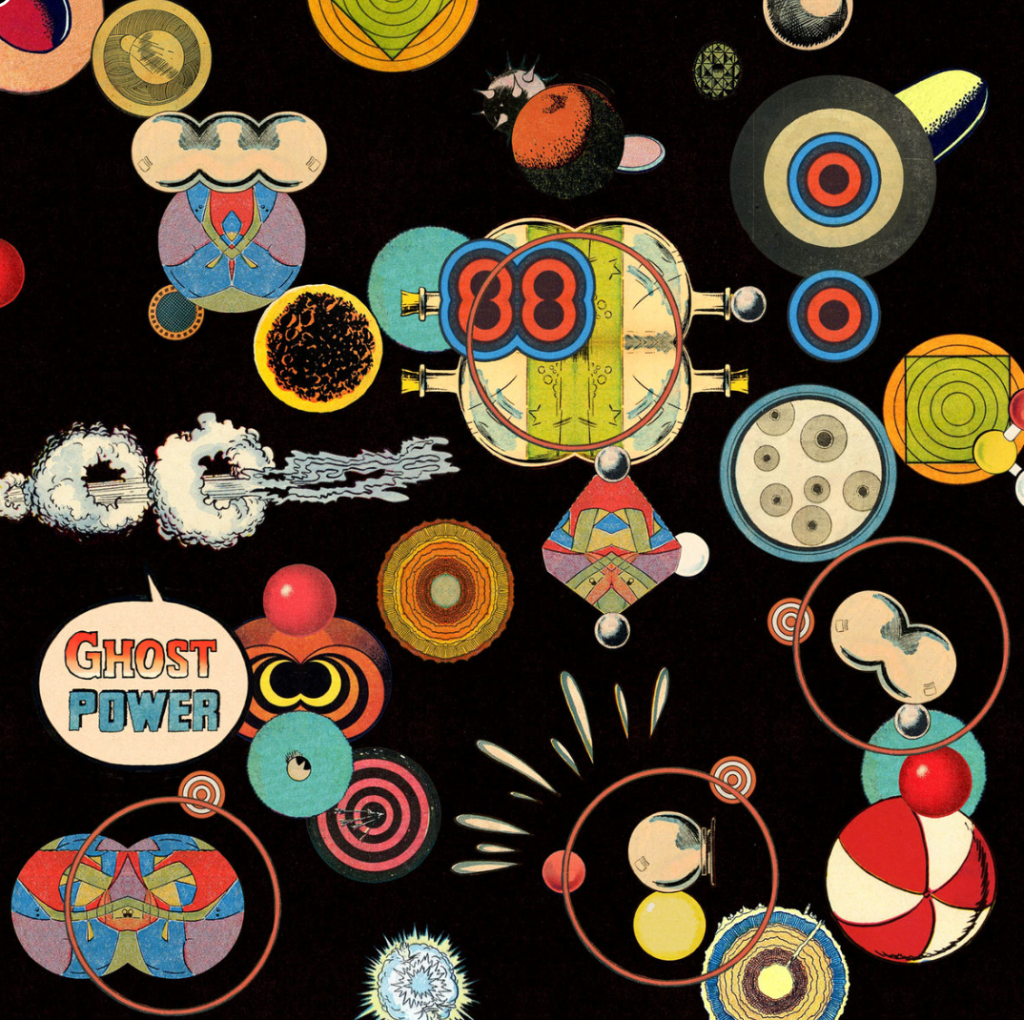
Two of the Duophonic Super 45s mail order label’s roster combine forces this month for a cult sounds coalesce of library music, soundtracks, psych and trip-hop. Serial offender in all things cultish, the kosmische universe and beyond, Stereolab’s Timothy Gane bounces nostalgic trips off his foil, Dymaxion instigator Jeremy Novak, under the newly minted Ghost Power guise.
Imbued by all that’s gone before them, recorded between sessions in both Berlin and New York (and remotely), the duo evoke a cosmology of cool and obscure mavericks on an album of fantasy (see the reference to Joseph Delaney’s witch assassin ‘Grimalkin’) and kitsch.
Matmos on a bum ride bubbles up inside a lava lamp with Bruno Spoerri and Arto Lindsay on the opening ‘Asteroid Witch’, whilst ‘Panic In The Isles Of Splendor’ could be the sort of obscurity dug up by the Finders Keepers label: that and a nocturnal insect rhythm of Alex Puddu and timpani soundtrack rousing piece of nonsense.
A transmogrification of an enviable record collection, in which Giallo schlock shares space on the shelves with space-disco-trance, 60s backbeats and Nino Nardini scores. Ghost power is a very knowing experiment in art for art’s sake; a knowledgeable take on library and cult sounds, with a few contemporary surprises.
Exterior ‘Umbilical Digital’
(Hobbes Music)

Without losing touch with rhythm and melody, the latest album from Edinburgh producer Doug MacDonald (under the guise of Exterior) is an experiment in texture, club sonics and live-sounding instrumentation. A largely percussive tapping, drum-skidding and bouncing affair, Umbilical Digital channels some quite eclectic tastes, with an array of both bpms and styles; from ambient scores to coarse abrasive guitar techno fusions.
The titular track, and opener, is a sophisticated metallic chrome propulsion of Basic Channel, Euro-trance and heightened warbles of something almost quivery and spooked. Yet by the second track, ‘Menu Diving Olympics’, the filters are subdued and more cosmic, the bass deeper, the beats like rattled ricochets, and the direction progressive. ‘Orthodox Dreams’ seems to have been partially lifted from the 90s: a bit of Sabers Of Paradise, a little Future Sound Of London. Yet it knocks and shakes, zaps and reverberates, to a contemporary mix of electronics.
The bottle, metal and tin rhythm tapping and pneumatic alarm clock bell chimed ‘Populist’ has a funky techno bent; reminding me of Psycho & Plastic and International Pony. ‘The Unbearable Shiteness Of Indie’ is less a polemic on guitar bands – MacDonald himself wielding one on this album; all feedback whines and caustic contouring – and more a floated, tunneled and slightly tropical merger between Sven Vath and Andy Weatherall.
The acid effects are subtly turned on for the trance-y geometric and soft thumped ‘Adoption’, and the Aphex Twin is sent down a flume on the slower beat-crunched, reversal tubular, robotic-stuttered ‘Tyranny Of Choice’. Carrying a certain weight, the finale, ‘Load Bearing’, goes all ambient and mysterious; a sort of soundtrack evocation of smoke forming on an otherworldly lake scene: creeping, sad with haunted, apparitional voices. As a last chill, it could be a lost Brian Reitzell score.
Synthesised music with a human touch, this album loses none of its experimental luster; still honed for the dancefloor as well as the head, whilst turning steel into something far more melodious. This is techno, electronica with a heart and purpose.
The Staple Jr. Singers ‘When Do We Get Paid’
(Luka Bop) 6th May 2022
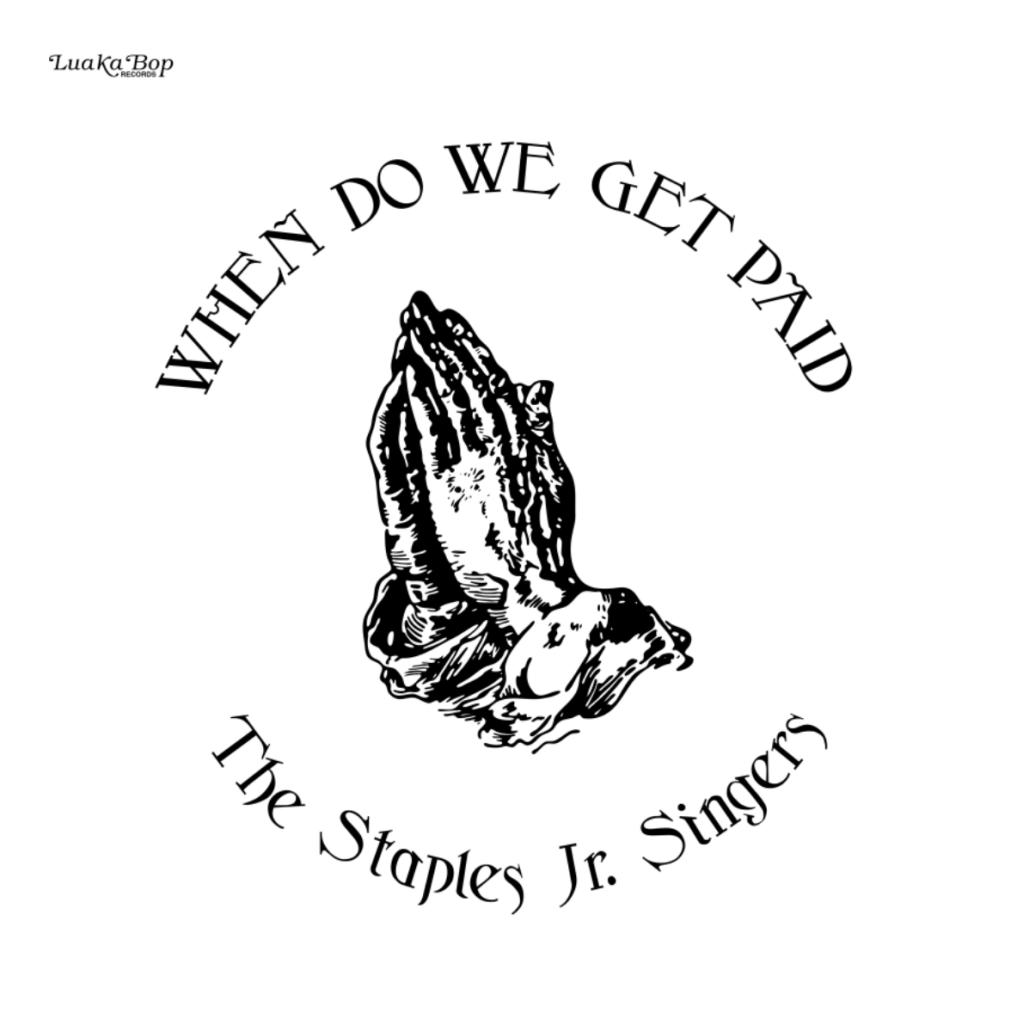
Revived five decades after its original, localized released in 1975, the good folk at Luka Bop make good on their incredible, enlightening compilation of obscured gospel and soul, The Time For Peace Is Now, with a dedicated reissue of The Staple Jr. Singers rarity When Do We Get Paid.
Pressed by that extremely young family unit themselves and sold at shows and on their neighbors front lawns, this rarefied showcase is finally getting an international release, prompting a number of live dates for the trio: their first in forty years!
From the banks of the Tombigbee River, honed in the family’s hometown of Aberdeen, Monroe County, the salvation searching, baptismal liturgy of Southern gospel gets an injection of conscious political soul, R&B, funk and delta blues. From the name you may have assumed that this trio were scions, the offspring perhaps of the divine stylers the Staple Singers. Without doubt a chip off the old block, the group’s moniker is purely used as homage in honour of their idols. Far younger, the Brown family of beautified and expressive soulful vocalists Annie and A.R.C. and guitarist Edward were in their teens when they recorded this, their sole, album in ’75. Yet despite being so young, the travails of the civil rights movement, social issues of the day, run throughout the trio’s equally earthy and heavenly soul music.
This was a sound touched by the afflatus yet grounded in the wake of Southern desegregation, unrest, the Vietnam War…the list goes on. So whilst Annie soars in full baby Staples mode, and with a vibe of Eula Cooper and Shirley Ann Lee about her, there’s plenty of attitude and sass to go around. Gospel music remains central however, with plenty of standard Bible belt exultations, paeans and passionate plaints. Some of which, no matter how familiar, seem to have some pretty unique and idiosyncratic rearrangement going on. Bolstered on the original recordings by bassist Ronnel Brown and Drummer Corl Walker, we’re treated to s Stax-like revue of reverence, the venerable and just down-country soulful funk. Echoes of Sam Cooke, Lulu Collins, Crusade Records, Chairman Of The Board and Nolan Porter follow humbled sermons on the soul train to Galilee. An electrifying songbook, When Do We Get Paid proves that this family trio possessed a raw talent, and could hold their own in a field packed with such incredible voices. It also proves there’s still much to learn and hear from that era of Southern soul and gospel. Great job Luka Bop.
Hi, my name is Dominic Valvona and I’m the Founder of the music/culture blog monolithcocktail.com For the last ten years I’ve featured and supported music, musicians and labels we love across genres from around the world that we think you’ll want to know about. No content on the site is paid for or sponsored and we only feature artists we have genuine respect for /love. If you enjoy our reviews (and we often write long, thoughtful ones), found a new artist you admire or if we have featured you or artists you represent and would like to buy us a coffee at https://ko-fi.com/monolithcocktail to say cheers for spreading the word, then that would be much appreciated.
COLLABORATION
WORDS: Monica Mazzoli

Over the last few years the Monolith Cocktail has been sharing a post each month with the leading Italian culture/music site Kalporz. This month Monica Mazzoli scouts out the sounds of the burgeoning artist, Leoni Leoni.
Bongo Joe Records of Geneva is one of those independent record labels (also a record shop) to always keep an eye on. In June 2022 a new release arrives that promises to be interesting and will make Leoni Leoni , musician, singer and producer from Bern better known to a wider audience: on vinyl and CD a collection dedicated to the Swiss underground artist who in recent years, between 2019 and 2021, produced a series of homemade cassettes: SUPER SLOW, EASY SLEEP, Yellow and Why, Drum Problems. The Bongo Joe compilation collects some of the songs already published on these cassettes where Leoni Leoni experiments with the deconstructed pop song form as if it were the memory, the dream of something else.
To discover.
